We write Stevens history
Men’s Volleyball wins second National Championship!
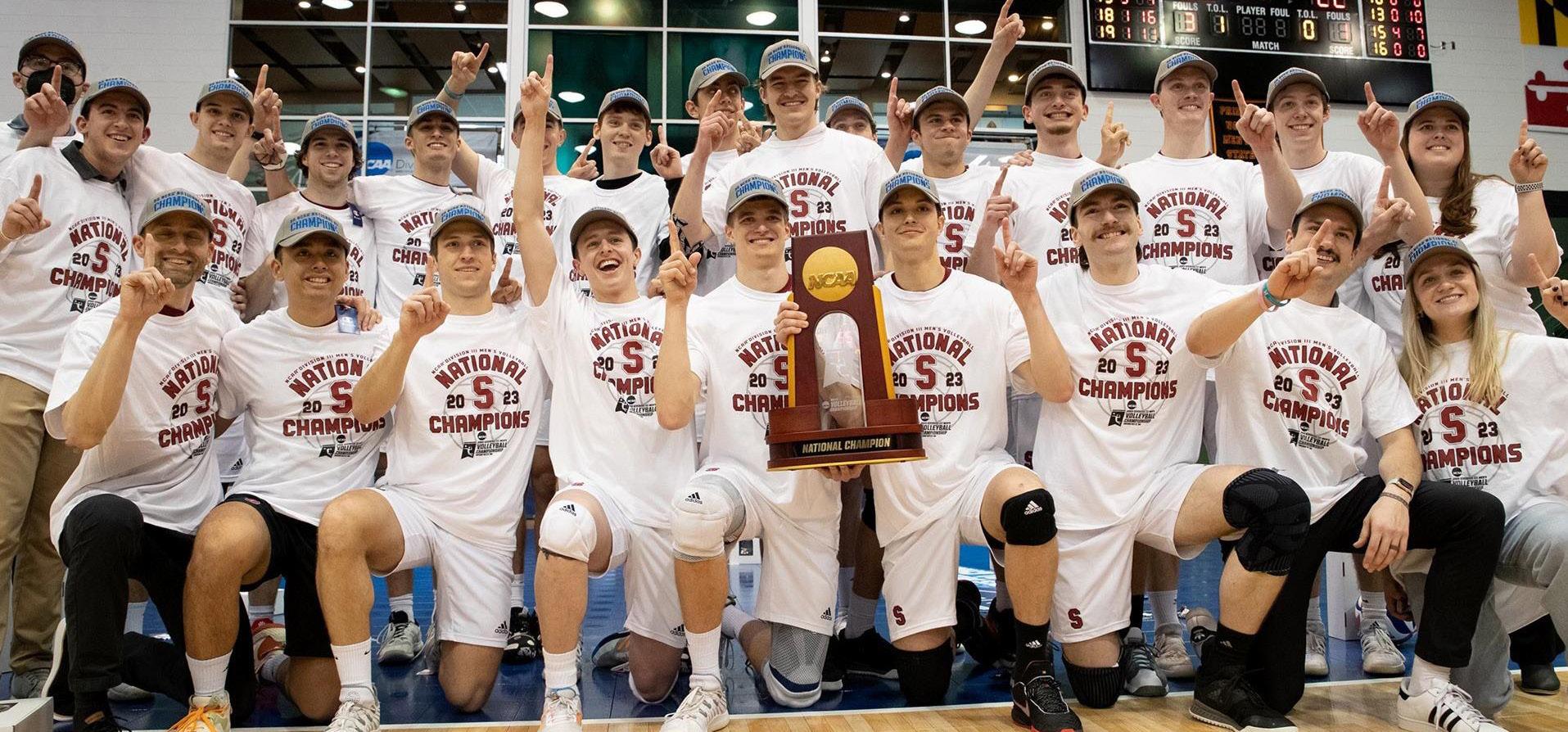
Office of Undergraduate Academics proposal to change the length of final exam scheduling
BY AVA WANG, MANAGING EDITOR BY KAI WONG, SPORTS WRITERThe No. 2 Stevens Ducks, led by sophomore Koby Sherman who had a match-high 16 kills and senior Connor Feulner who finished with nine kills and five blocks, defeated No. 5 North Central College 3-1 in the national championship match hosted by Stevenson University.
Senior Percy Bickford had 11 kills, and classmate Louden Moran dished out 40 assists for the Ducks, who won their seventh straight to finish with a school-record 35 victories. Bickford, Sherman, and Feulner were each named
to the NCAA’s All-Tournament Team. Moran took home Most Outstanding Player honors after totaling 145 assists over 13 sets across the Ducks’ four NCAA Tournament wins, while also leading the team to a 0.336 hitting percentage. For North Central, Luke Schmidt had 10 kills to lead North Central, but the team’s efforts were not enough, as the Cardinals’ 17-match winning streak came to an end. The Ducks held North Central’s Ben Williams, who finished with 16 kills and a 0.444 hitting percentage in the semifinal sweep of top-ranked Vassar, to only six kills and a
Montana Governor Greg Gianforte signs anti-trans bill into law
BY CLAIRE HANNAN, SECRETARYOn Friday April 18, Montana Governor and Stevens alumnus, Greg Gianforte signed into law Senate Bill 99, banning medical treatment for gender dysphoria for minors, including hormones and surgeries. On April 14, The Stute published an article interviewing Torch Alliance President, Hailey Veres, on her thoughts about the bill before it was signed. Since the release of that piece, there has been significant pushback against this bill including from Representative Zooey Zephyr, a transgender lawmaker for the Montana Legislature. Zephyr gave a speech on the House floor earlier in the week before the signing where she stated that this bill would put “blood on [the] hands” of her colleagues. In the days following her speech, House leadership refused to call on Representative Zephyr during discussions, both for Bill 99 and all other bills being passed. The Montana House has also taken steps to block Zephyr, a democratically elected official, from speaking on the House floor.
Another voice pushing
NEWS (2-3)
Men’s Volleyball wins MAC Championship!
The Ducks are now two-time Division III champions after winning Stevens’ first-ever team national title in 2015.
FEATURE (4)
APIDA Heritage Month Intergenerational Trauma, Shared Experiences and Joy through Film Event.
back against the legislation has been Governor Gianforte’s own son, David Gianforte (he/they), who is nonbinary. David Gianforte asked his father to reject this bill on the grounds of it being “immoral, unjust, and frankly a violation of human rights.”
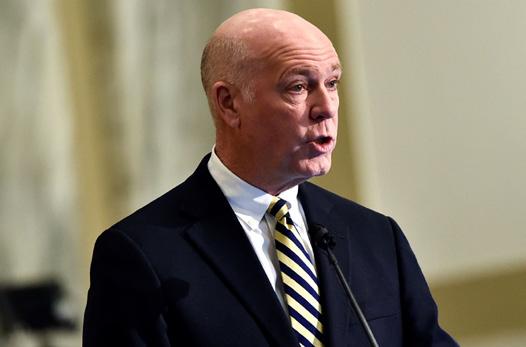
The governor’s office issued a brief statement following the signing that Greg Gianforte is “committed to protecting Montana’s children from invasive medical treatments that can permanently alter their healthy, developing bodies.” Despite this stance, many major medical organizations have researched this kind of care and support its use for minors. Among them, professionals within the Columbia University Department of Psychiatry found that “research demonstrates that gender-affirming care [...] greatly improves the mental health and overall well-being of gender diverse, transgender, and nonbinarychildren and adolescents.”
negative hitting percentage.
The Ducks took a commanding lead in the beginning of the first set, despite North Central scoring two of the match’s first three points. Sherman set down his first kill of the match to return service to the Ducks and it was only up from there. Stevens did not take its foot off the gas, claiming four straight points to extend its lead. Sherman and Bickford combined for eight kills as Stevens forced North Central into a blocking error and consecutive attack errors, giving the Ducks the opening set.
In the second set, Stevens took an early lead
News channel crackdown on radical reporters
BY TANYA AVADIA, BUSINESS MANAGERThe recent breaking news of popular Fox News host Tucker Carlson leaving the news platform has been taking the world by storm. Carlson had joined Fox News in 2009 as a contributor and later co-host of Fox and Friends Weekend from 2012 to 2016. His night show, Tucker Carlson Tonight debuted in 2016 and since then has gotten a massive following, averaging about 3 million views nightly. However, as popular as his show may have been, it has also sparked various controversies due to demeaning comments about women, people of color, and immigrants.
Some of the ideas presented on and supported by Carlson on his show include downplaying the severity of the January 6 attack on the Capitol and claiming that the 2020 presidential election was stolen and that Donald Trump was the real winner. This has gar-
again on a solo block by first-year Tyler Hoke and a pair of kills by Sherman. North Central gained some ground back, reeling off four straight points to take a slim 12-11 lead. The lead was short-lived, as Stevens responded with kills from Sherman and Moran and an ace from graduate student Colin Nikc to take a 19-14 lead. After a short run by the Cardinals to knot both teams up at 23, Sherman and Lancia’s kills closed out the set to give the Ducks a 2-0 lead in the match.
North Central turned in its best performance of the match in the third set. Stevens threatened to pull away and sweep North
Bleach in washers
BY KATIE BLOOMER, STAFF WRITERTowards the beginning of last week, a parent on the Stevens Institute of Technology Parents Facebook page made a post explaining that their child’s clothes were ruined by bleach that they were unaware was in the washing machine. The clothes came out of the machine with irreparable splotches after being partially bleached. Photos showed at least five pieces of clothing that were destroyed, with the post stating that the entire load of laundry was contaminated. The parent stated that the clothing of another student was also found to be ruined and in even worse condition than her son’s. The particular instance being posted about on Facebook occurred in Davis Hall. There were at least two machines that were found to have contained bleach, but likely more because three students have come forward with similar experiences in the past few days. It is unclear if this was a prank or machine malfunction, but due to the numerous machines simultaneously having the same issue, there
Central, but the Cardinals orchestrated five straight points highlighted by a pair of double blocks by Jeremy Cardenas and Tyler Donovan. The Ducks were able to trim the deficit to two at 8-6, but a 7-1 run from North Central broke the set open. North Central was able to close out the third set with a kill from Mitchell Hester, making the match 2-1 in favor of the Ducks.
The final set saw the teams play the most contested action of the match, playing to 13 ties and five lead changes. The Ducks trailed by one after a threepoint swing to make it 19-
The Office of Undergraduate Academics recently sent out a survey to all current juniors, sophomores and first-year students requesting feedback on the length of the final exam periods for undergraduate courses. The survey consisted of a single multiple choice question asking students what their exam length preference is: Remain at 3 hours, reduce to 2 hours and 30 minutes, or reduce to 2 hours.
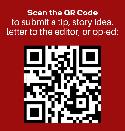
The purpose of this survey was to explore the feasibility of a standard block time grid for final exam scheduling, and may mark a shift towards shorter final exam length. This semester, the Spring 2023 Exam schedule is set to run from Friday May 5 through Tuesday May 16, with three-hour blocks set as the standard SEE MVB PAGE 2 SEE FINAL PAGE 3
Governors Island to become an innova-
hub of climate research and education
BY EVAN PAPAGEORGE, OPINION EDITORIn the 21st century, global warming has grown into a societal threat that puts almost all aspects of life at risk; rising sea levels to more frequent and intense storms increased drought and increases in extinction rates. With this crisis in mind, New York City Mayor Eric Adams announced that Governors Island would be made into a center of advocacy for a “clean er, green er, more pros per ous future for every New York er” in a post from the Governors Island blog, a sanctuary of climate research and development: The New York Cli mate Exchange.
State University of New York (SUNY) Stony Brook has been selected to lead the revolutionary transformation of Governors Island, a small 172-acre island in New York Harbor, just south of Manhattan Island and a quick 400-yards from Brooklyn across the Buttermilk Channel. The island is operated primarily by the National Parks Service under the jurisdic -
tion of the aforementioned Trust for Governors Island. With a rich local, native, world, military, commerce, and political history, the island has been at the center of culture for centuries — and will continue to be as it is transformed into an innovative climate research and exploration facility.
The Exchange will be designed and run by SUNY Stony Brook as a state-ofthe-art science, research, fine art, performance, and natural public complex; featuring student housing, innovative research facilities, restored-historic theaters, and water-side walkways, all using the most recent developments in renewable energy, reused materials, water recycling, living buildings, and landfill diversion techniques, helmed by New York City’s renowned Skidmore, Owings & Merrill of One World Trade Center, The Burj Khalifa, the Smithsonian, part of JFK Airport, and more.
According to its new website, the Exchange is “a first-of-its-kind, cross-
SCIENCE (6) James Webb Telescope, new ferries for Galapagos Islands, and clinical depression research
Read the latest in science news.
PULSE (12)

Read answers from the Stevens community to our weekly Roving Reporter, plus solve our weekly puzzle and sudoku

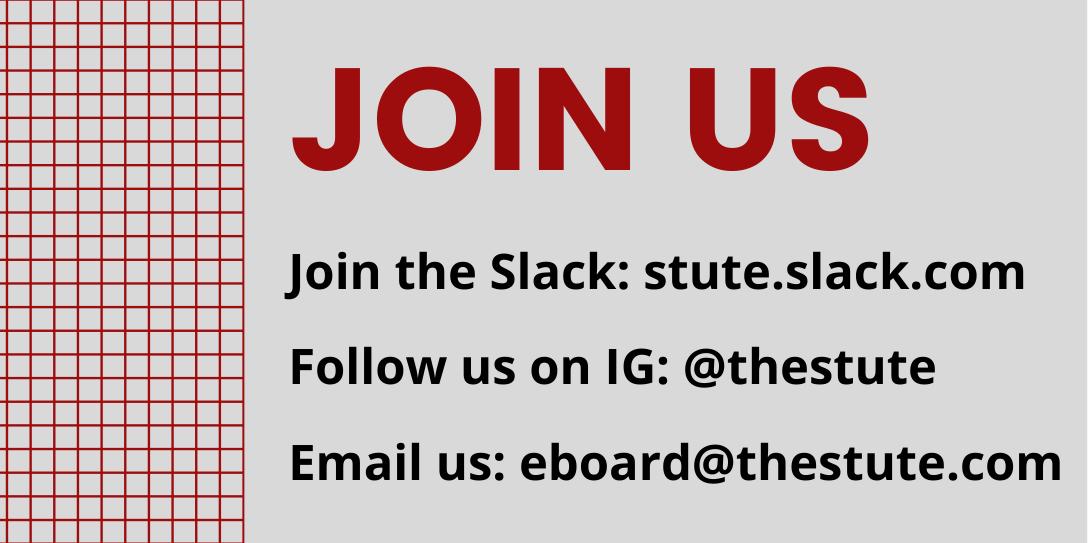
tive
Masthead Volume CXX No. 25
Executive Board
EDITOR-IN-CHIEF......................................ISABELLA ZIV ‘25
BUSINESS MANAGER............................TANYA AVADIA ‘26
MANAGING EDITOR.......................................AVA WANG ‘25
LAYOUT EDITOR................................NICOLE GIARDINO ‘25
OUTREACH CHAIR KAYDEN CANNILLA ‘24
DIGITAL MANAGER................................RAFAEL LEE LI ‘24
SECRETARY CLAIRE HANNAN ‘24
HEAD COPY EDITOR KEENAN YATES ‘24
Editorial Board
NEWS EDITOR.........................................BEN KNOBLOCH ‘25
SCIENCE EDITOR.........................................ERIN MCGEE ‘25
OPINION EDITOR............................EVAN PAPAGEORGE ‘26
SPORTS EDITOR........................................CHRISTA RUIZ ‘25
FEATURE EDITOR..................................TASHA KHOSLA ‘25
ASSIS. COPY EDITOR ISABELLA HAMM ‘25
Operations Board
HEAD PHOTOGRAPHER......................OLOF PERSSON ‘25
SOCIAL MEDIA MANAGER............VANESSA HUERTA ‘23
Staff & Contributors
Charles Beall
Cole Gardella
Ethan Kleschinsky
Hima Thummala
Itai Geller
Joey Ames
John Horgan
Kai Wong
Katie Bloomer
Matthew Brantl
Mia Petrolino
Nick Smith
Quentin Jimenez
Ruthie Mullisky
Stephen Pachucki
Tanishka Kapoor
Vitek Sabath
Zoe Hack
All opinions and editorials reflect the views of their respective author(s). No Part of The Stute may be reproduced in any form, in whole or in part, without the written consent of the Editor-in-Chief. Cited references of The Stute are permitted.
All members of the Stevens community are able to submit a Letter to the Editor to be published in The Stute. Letters must refer either to a piece published in The Stute or to The Stute in general and must be between 400 – 800 words in length. Submit letters to editor@thestute.com with your name and title (when applicable) or using our Google form. For writers who wish to write a Letter to the Editor anonymously, please see our policy on anonymity.
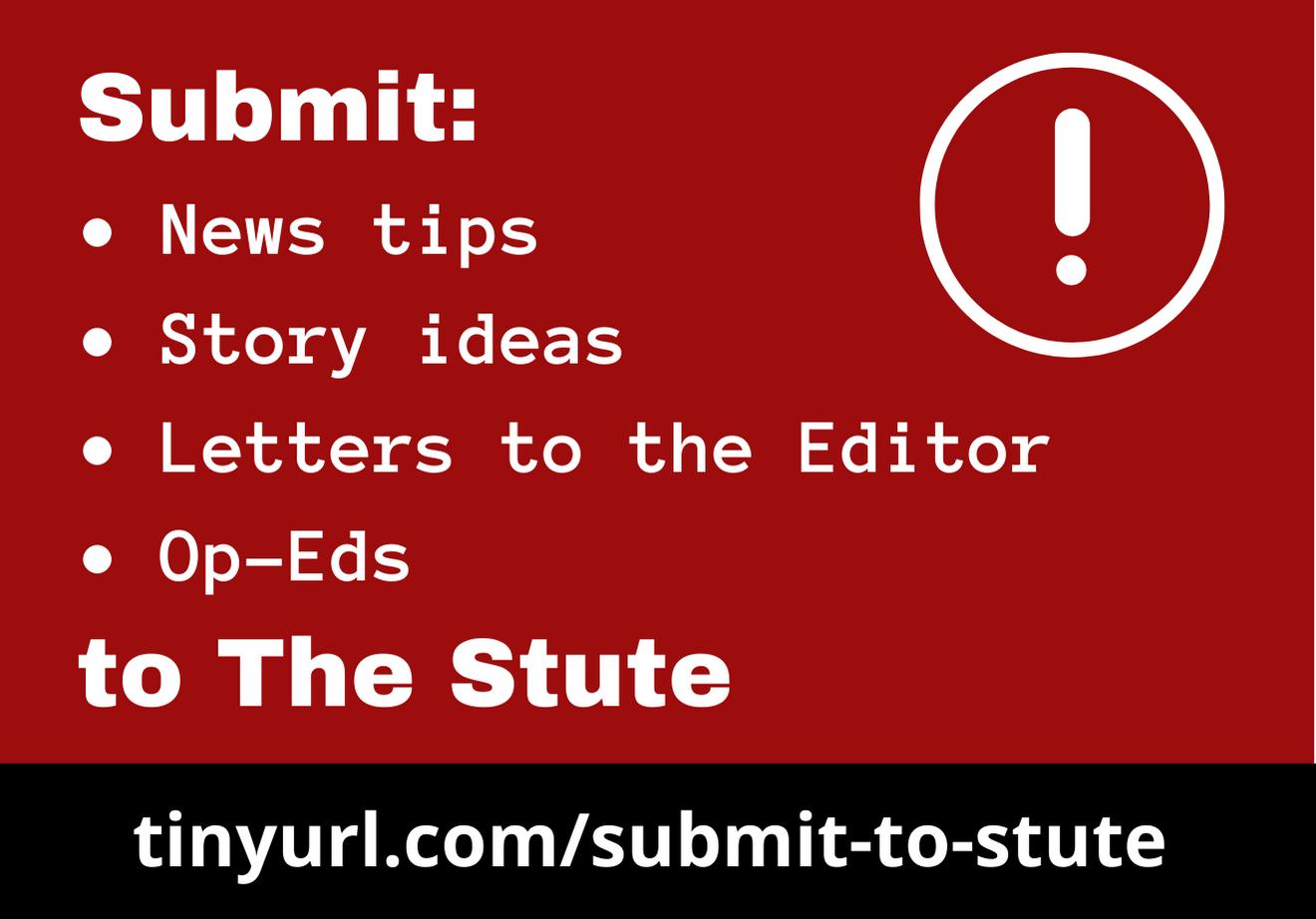
The Editorial Board reserves the right to choose whether or not to publish a submitted Letter to the Editor based on a majority rule vote, and additionally reserves the right to edit letters for clarity or request authors to revise. Provided that the author approves the final version, The Stute reserves the right to edit letters according to our copy editing procedures, defined in our policies.
All members of the Stevens community are able to submit a standalone opinion piece (otherwise known as an Op-Ed) to be published in The Stute. Op-Eds must be between 400 – 800 words, but longer submissions will be considered on a case-by-case basis. To submit an OpEd please email eboard@thestute.com with your name and title (when applicable) or using our Google form (tinyurl.com/submit-t0-stute). For writers who wish to write an Op-Ed anonymously, please see our policy on anonymity.
The Editorial Board reserves the right to choose whether or not to publish a submitted Op-Ed based on a majority rule vote, and additionally reserves the right to edit Op-Eds for clarity or request authors to revise. Provided that the author approves the final version, The Stute reserves the right to edit Op-Eds according to our copy editing procedures, defined in our policies.
CONTINUED FROM PAGE 1
nered him a lot of backlash, even from Republican Senators such as Thom Tillis of North Carolina and Kevin Cramer of North Dakota. All of these instances of misinformation blew up into a $787 million defamation lawsuit against Fox News by Dominion Voting Systems. Dominion Voting Systems sued over Fox News making claims about election fraud for the 2020 presidential election. The lawsuit was recently settled for $787 million dollars and following that it was announced that Tucker Carlson would be leaving the news platform. “FOX News Media and Tucker Carlson have agreed to part ways. We thank him for his service to the network as a host and prior to that as a contributor,” Fox News said in a statement. This announcement has left a lot of people puzzled as Tucker Carlson was a high-ranking
MVB
CONTINUED FROM PAGE 1
18 in favor of the Cardinals, but a North Central service error knotted the score. Sherman had backto-back kills to push the Ducks closer to history. North Central
individual with the organization. However, Carlson is still in hot water for numerous reasons. Texts to his staff from January 2021 stated, “We are very, very close to being able to ignore Trump most nights. I truly can’t wait,” and “I hate him passionately” in reference to Trump. This led to a rift between him and Trump but later it was revealed by Carlson that him and Trump apparently reconciled. A more serious accusation against Carlson and several others within Fox news was made by Abby Grossberg, his former senior booking producer, who filed a lawsuit regarding sexism and harassment. Grossberg highlights two instances in her lawsuit: 1) mocked-up photographic images depicted thenU.S. House Speaker Nancy Pelosi “in a bathing suit revealing her cleavage” and 2) staff members being polled on two separate occasions about which of the two female candidates for the Michigan gubernatorial election they would rather have sex with. Tanvir Rahman, one of Grossberg’s
responded with a kill and a block in the hopes of keeping its season alive. Following a North Central timeout, Feulner knocked a Moran pass splitting the Cardinal defense to close out the fourth set, sending the Ducks into celebration.
The Ducks are now two-time Division III champions after
lawyers, stated, “Tucker Carlson’s departure from Fox News is, in part, an admission of the systemic lying, bullying, and conspiracy-mongering claimed by our client,” in response to Carlson’s departure from Fox News. Grossberg’s own response to Carlson’s ouster is “This is a step towards accountability for the election lies and baseless conspiracy theories spread by Fox News, something I witnessed firsthand.”
Tucker Carlson isn’t the only TV personality to be let go by their news media. Don Lemon, an anchor on CNN, was also fired after 17 years with the company. Lemon was let go after multiple accounts of misogyny such as claiming women past their 40s aren’t in their prime and thus should not hold public office in reference to presidential candidate Nikki Haley and other similar accounts. The ousting of Don Lemon and Tucker Carlson is a crucial step in the process of accountability, as people who have a huge platform to outreach to the public should use this power responsibly.
winning Stevens’ first-ever team national title in 2015. Stevens also won the 45th team national championship in Middle Atlantic Conference history and the first in men’s volleyball. Stevens now joins Carthage and Springfield as multi-time Division III champions. Congratulations to Men’s Volleyball on a successful season!
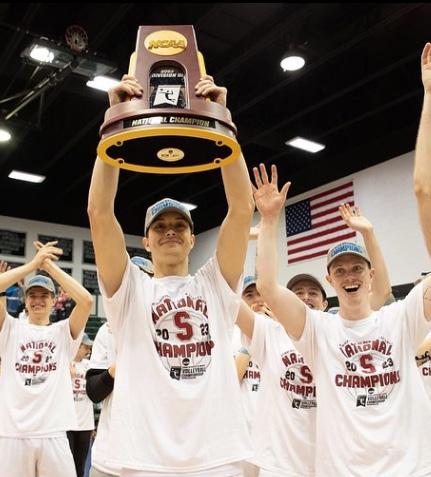
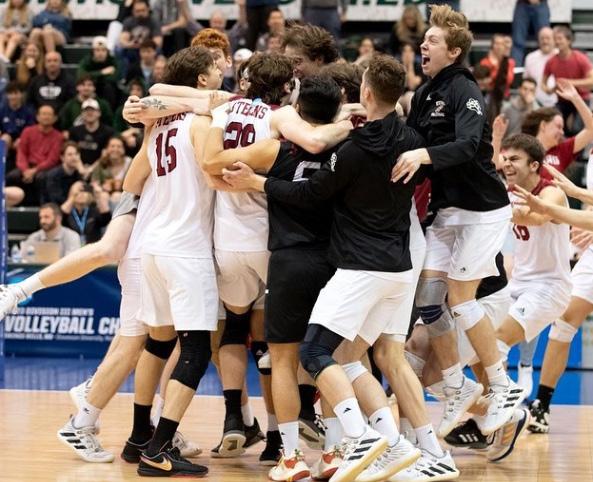
Law Society and ODAE host pre-law alumni panel
BY EVAN PAPAGEORGE, OPINION EDITORHere at Stevens, although small, the law department continues to be an integral part of the university. One recent event, hosted by the Stevens Law Society in collaboration with the Office of Development and Alumni Engagement featured Stevens graduates speaking about their experiences and journeys through the legal industry since their time here at Stevens.
The event, which took place on the evening of Tuesday April 25, was open to all students, not just those pursuing law, as the two panelists themselves did not attend Stevens for law. The panelists were Margaret Goeckle and George Johnston. Goeckle graduated from Stevens in 1995 with a Master of Science in Telecommunications Management. Since then, she has worked across the industry in multiple positions, culminating in her current role as Chief Privacy Officer, Vice President, Privacy and Information Governance at Hewlett Packard Enterprises.
The other panelist was Goerge Johnston, who graduated from Stevens in 1972 with a bachelor’s degree in chemical engineering. From there, he worked at a leading law firm in Manhattan and then at a pharmaceutical firm where he is now Chief Parent Council for Hoffmann-La Roche.
The event began with each panelist explaining how the routes they took to their current positions were very different, despite both attending Stevens. For Johnston, he focused on patent law and worked at one of the premier law firms in New York City, before deciding that was not the right environment for him. He moved across the river to New Jersey to work for pharmaceuticals. He went to law school full-time to get his degree quickly to sooner be able to work in the law industry.
Stevens start-up BGS Threads advances to the semifinals of the 2023 Hult Prize Challenge
Goeckle, on the other hand, had a very different story. She did not attend Stevens as an undergraduate but came here to get a background in technology so she would be better equipped to work in the rapidly growing computer privacy industry. She worked in corporations, not as much of a legal position like Johnston, but more as an engineer — working to set up data centers and other production positions. Although it was an interest for her throughout her career, Goeckle’s work in the legal field has been more through applying and investigating it in the field.
One theme that was consistent through both presentations was intellectual property. Johnston gave a brief overview of intellectual property, including trademarks, patents, and copyrights, and then expanded that into different careers students interested in intellectual property can take from The Department of Justice and patent work to litigation.
Following the presentations, Goeckle and Johnston opened the floor for questions from students in the audience, which was composed of engineers, chemists, pre-med students, and literature students, to name a few. Students asked what their next steps might be after Stevens, how to decide which aspect of the law to continue in if they were not sure, and what life is like across those different legal industries. The panelists did their best to answer the questions, but if they did not, they offered advice on how to find the answer to the student’s questions.
This event was a great opportunity for Stevens students to hear more from professionals in the legal field, and perhaps now have a better idea, or at least know where to look, to pursue their interests in the legal field. Thanks to Margaret Goeckle and George Johnston for sharing their experiences and journeys through the legal industry since their time at Stevens, offering valuable insights and advice to students of all majors.
BY EVAN PAPAGEORGE, OPINION EDITORHere at Stevens, innovation is always at the forefront of the minds of everyone, from students all the way up to President Farvardin. When a Stevens start-up, known as BGS Threads, made it to the semifinals of the 2023 Hult Price Challenge, allowing it to attend the competition summit in Rio de Janeiro in Brazil, it proved that Stevens continues to be an epicenter of success and innovation.
Sabrina Benayoun, an environmental and sustainability student here at Stevens, was working with Professor Dibs Sarkar from the Department of Civil, Environmental, and Ocean Engineering. Sarkar informed Benayoun of the Hult Prize Challenge, a global competition for young entrepreneurs run by the Hult Prize Foundation. According to their website, “The Hult Prize challenges young people to solve the world’s most pressing issues through social entrepreneurship. Every year, one team receives $1M USD in funding to make their idea a reality.” For this year’s competitions, the Hult Prize Foundation offered a challenge: “to create a
FINAL
CONTINUED FROM PAGE 1
examination time. Students cannot be scheduled for exams on Sundays, but there are still six classes scheduled for Saturday exams.
The Office of Undergraduate Academics shares in its survey email that the standardized time block grid would allow it to compress the schedule down to the university’s week-long final examination schedule, and claims that shortening exam periods to 2 or 2.5 hours would benefit both students and instructors.

Block scheduling would allow students, particularly international or out-of-state students, to better plan their end of semester travel arrangements. The short-
WASH
CONTINUED FROM PAGE 1
speculation that it was intentional. Some parents disagree and are responding to the post stating that it was likely an accident because machines can hold onto extra bleach and dispense it into the next load. Stevens has not specifically addressed this and if there
GOV
CONTINUED FROM PAGE 1
tor non prof it orga ni za tion ded i cat ed to cli mate research, solu tion devel op ment, edu cation, work force train ing, and pub lic pro grams on Gov er nors Island.” The project consists of multiple programs devoted to different disciplines like environ men tal jus tice and inclu sion, ener gy, water, and food sys tems, and sus tain able urban environ ments. Organizations like the Waterfront Alliance, Lower Manhattan Cultural Council, Museum of the City of New York, Nontraditional Employment for Women (NEW), along with many different schools like New York University, the University of Oxford, Rochester Institute of Technology, the Pratt Institute, Duke University, and many corporate partners like IBM, Boston Consulting Group, Vari ety Boys & Girls Club of Queens, and Boston Con sult ing Group will all be participating in this ground-breaking collaborative effort.
Construction on the project is slated to begin in 2025 and be completed by 2028, although delays can be expected for such a monumental project in the heart
for-profit social venture in the fashion/clothing industry. Your idea must create a measurable positive impact on people and the planet and support the United Nations in meeting its SDGs by the 2030 deadline.”

Benayoun had a very short amount of time before the deadline to submit for the competition, but decided to compete nonetheless. Benayoun got together a team to create their own business idea for the Hult Prize Challenge. Consisting of students from many different disciplines, including Civil and Environmental Engineering as well as biology.
Benayoun and Anastasia Ivanov, Keilly Valverde, and Ryan Krawczyk put together a presentation for their business proposal: BGS Threads. BGS Threads is the team’s business proposal. It is a clothing company that focuses on sustainability. What sets them apart from traditional clothing companies is that all of its materials are made from bagasse, or sugarcane fibrous waste. The company is a great example of the circular economy model, which, according to the Environmental Protection Agency, “keeps materials, products, and services in circulation for as long [as] possible.” The
er exam period and standardized grid scheduling would enable the Office of Undergraduate Academics to set the final exam schedule prior to the start of each semester — which is significantly earlier than the current method. This semester, students had to wait until March 1 for the final exam schedule to be released. During the Fall 2022 semester, students had to wait until October 11. Late notification of final examination delays travel plan scheduling. This is particularly detrimental during Fall semesters, where the final exam period is expected to end during peak winter holiday travel.
On the flip side, a compressed finals schedule introduces an increased likelihood of scheduling conflicts. With a shorter, standardized examination period, students benefit from shorter exams, but are also more likely to have
is going to be an investigation into the cause of the bleach in the washers. In an effort to avoid more damaged clothing, Stevens will be cleaning and sanitizing all washing machines in Davis to remove any remaining bleach. The Residential Education staff sent out a message via Roompact following the incident. The email reminded residents that bleach should not be used in any communal washing
of New York City. While some raise concerns for the existing aspects of the island, from the natural environment to the historic buildings and grounds, the project is working to preserve the history of Governor Island’s Historic Dis trict and South Island Park along with the restoration of heritage buildings like Liggett Hall and the Fort Jay The ater.

The project has overall had a great reception from environmentalists, architects, civil engineers, historians, and citizens alike. As students at Stevens, the “Innovation University,” this
team’s goal, beyond doing well in the competition, was to offer both sustainable methods and reduced carbon footprints and waste.
Another aspect of BGS Threads is its focus on inclusivity. One aspect of the project is to offer one-size-fits-all clothes to encourage inclusivity and representation. Additionally, the team ensured that BGS Threads would work with local communities to give back to those in need.
Benayoun, Ivanov, Valverde, and Krawczyk will be traveling to Rio de Janeiro in Brazil to compete in the 2023 Hult Challenge Summit in for the competition. Rio de Janeiro is just one of 12 summits with host cities across five continents and over 100,000 participants. If the team advances, they will be invited to the Global Finals in Paris, France, the world’s fashion capital.
GBS Threads is an outstanding example of innovation thriving here at Stevens, with sustainability and inclusivity being focal points across campus. Congratulations to Benayoun, Ivanov, Valverde, and Krawczyk on their hard work and dedication to this project, and good luck in the semifinals at the summit in Brazil.
multiple exams scheduled for the same day. It remains unknown how professors will adapt their final exams to reflect the shorter examination period. One would hope that a shorter exam period would translate to less content on the exam, but less content on the final exam means that even fewer questions account for the same large percentage of your final course grade. It was also not shared whether or not the standard block grid compression to a week-long exam window would preserve Undergraduate Reading Day, which provides undergraduate students with a one day break between the last day of classes and the beginning of final exams.
The Office of Undergraduate Admissions’ survey closed on Wednesday April 26. The results and impact of the survey are yet to be announced.
machines on campus. This message was sent to all residents, regardless of the residential hall that they reside in.
Students who had these clothes damaged are able to file a claim. There was also discussion in the comments section of the post wondering if the clothing damaged would be covered by dorm insurance. Specific information about the results of filing a claim or using dorm insurance is unknown.
project shows the developments in many different disciplines that make Stevens the school it is. To close, Mayor Adams offered some inspiring words about the project: “This first-of-its-kind project will make New York City a glob al leader in devel op ing solutions for cli mate change while cre at ing thou sands of good-paying green jobs for New York ers and infus ing $1 bil lion into our city’s econ o my. Where some people see chal lenges, New York ers see oppor tu ni ties, and this team and this project are lead ing the charge.”
APIDA Heritage Month: the weight of a name
BY TASHA KHOSLA, FEATURES EDITORAccording to the Office of Diversity, Equity, and Inclusion, “APIDA Heritage Month recognizes and celebrates the cultures, contributions, and traditions of Asian, Pacific Islander, and Desi Americans [APIDA]. The month of May was chosen to commemorate the beginning of Japanese immigration to the United States on May 7, 1843, and to mark the anniversary of the completion of the transcontinental railroad (built primarily by Chinese immigrants) on May 10,1869. While APIDA Heritage Month is nationally recognized in May, many colleges and universities celebrate in April.”
This past April, multiple organizations on Stevens campus hosted events to celebrate APIDA Heritage Month. The Indian Undergraduate Association hosted a Masquerade Ball Night, the Chinese Student Association hosted Dim Sum Night and a Chinese Painting Workshop, FAST Game Show was hosted by the Filipino Association at Stevens Tech (FAST), and a Science Fair was hosted by the Society of Asian Scientists and Engineers. Additional events included Lore El’s Henna Night, Sigma Psi Zeta’s SA Awareness Workshop, and the Korean Student Association’s Family Day event.
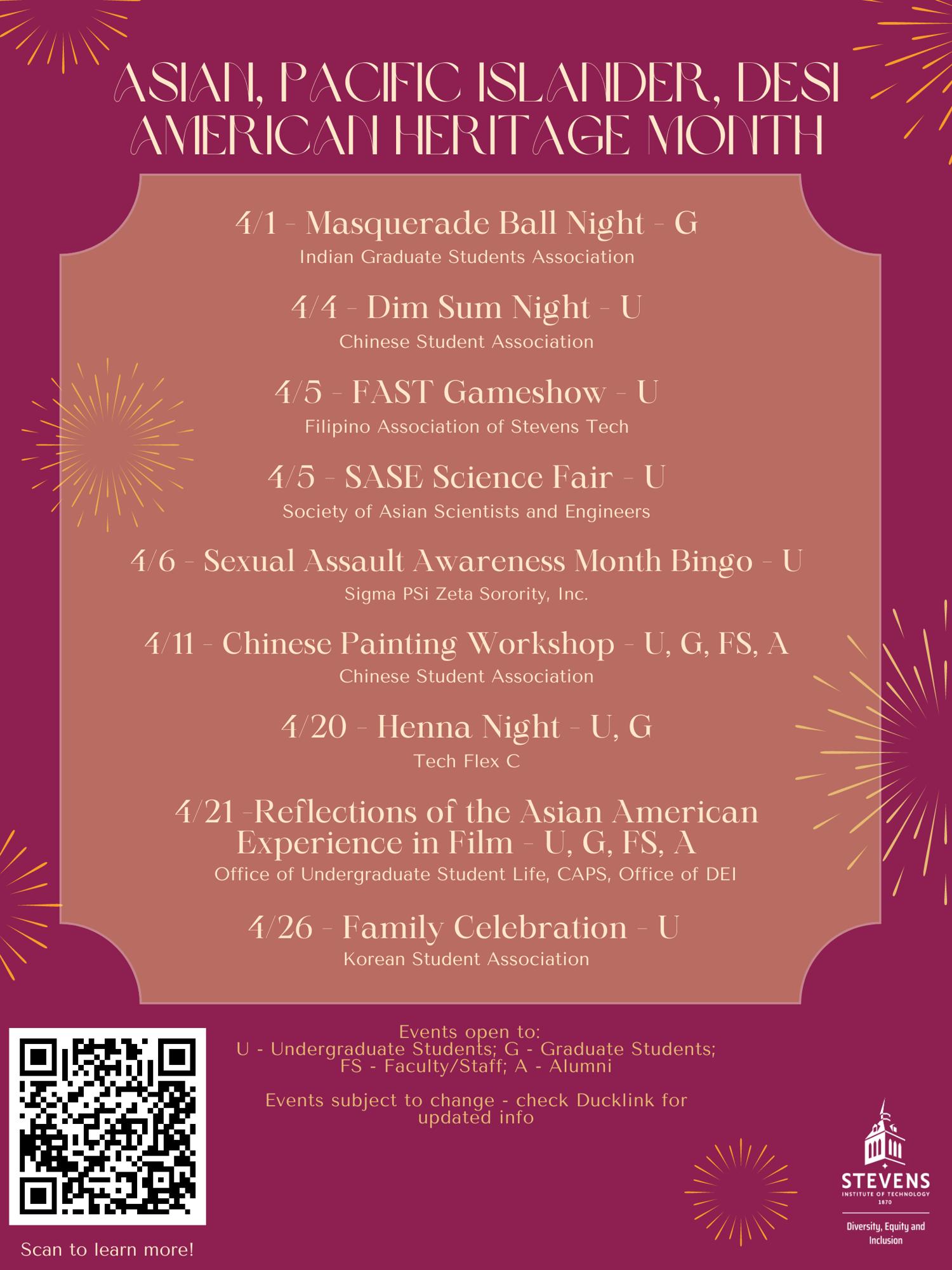
While APIDA Heritage Month is celebrated across the country, readers may be more familiar with the term “AAPI” or simply the phrase “Asian American Heritage Month.” The term APIDA is relatively new, but characterizes the struggles activists have faced overtime in order to coin a more inclusive term to recognize different cultures within the broad Asian American community.

As discussed by the nonprofit
Reflections of the Asian American Experience: Intergenerational Trauma, Shared Experiences and Joy through Film Event
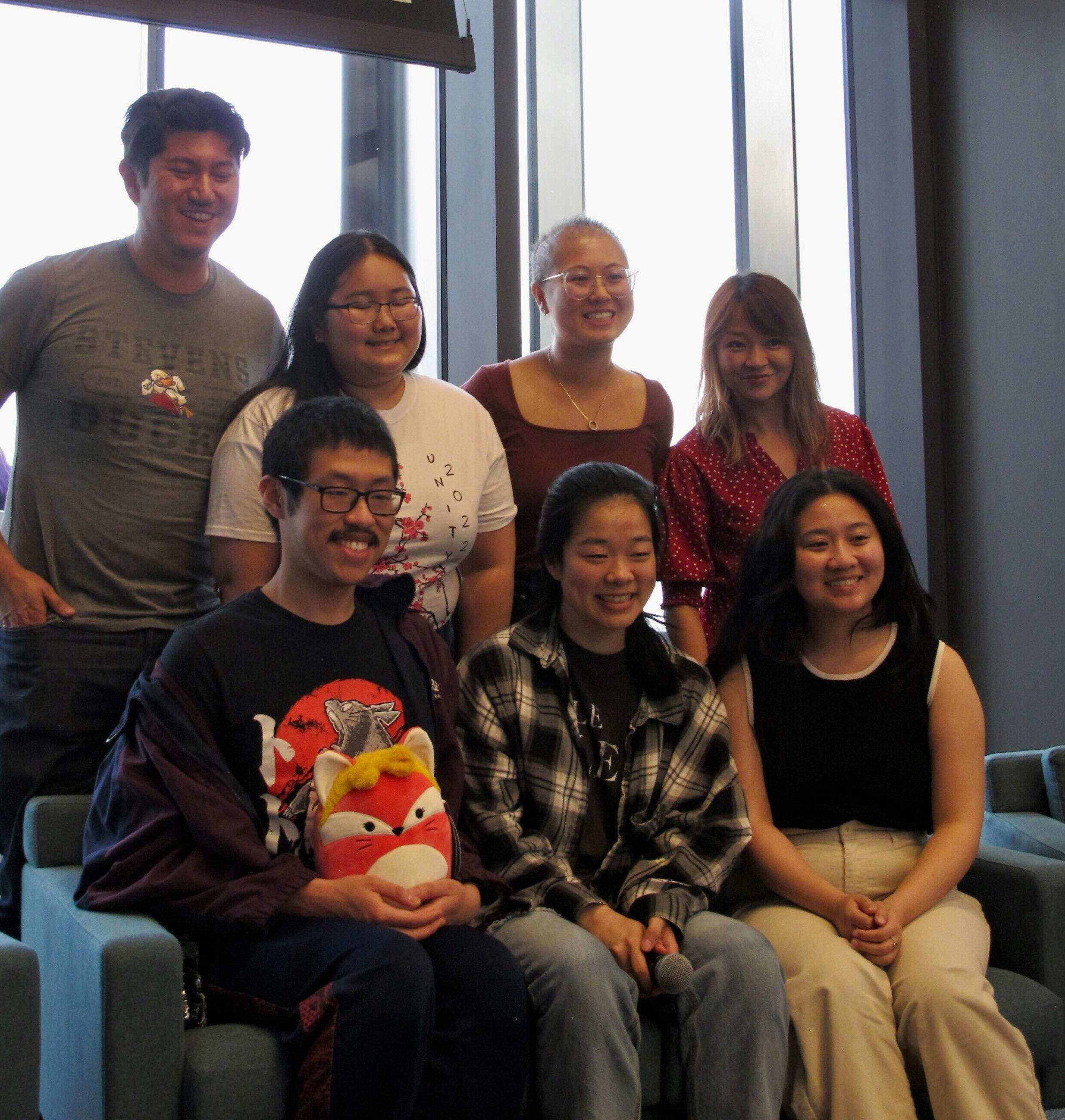
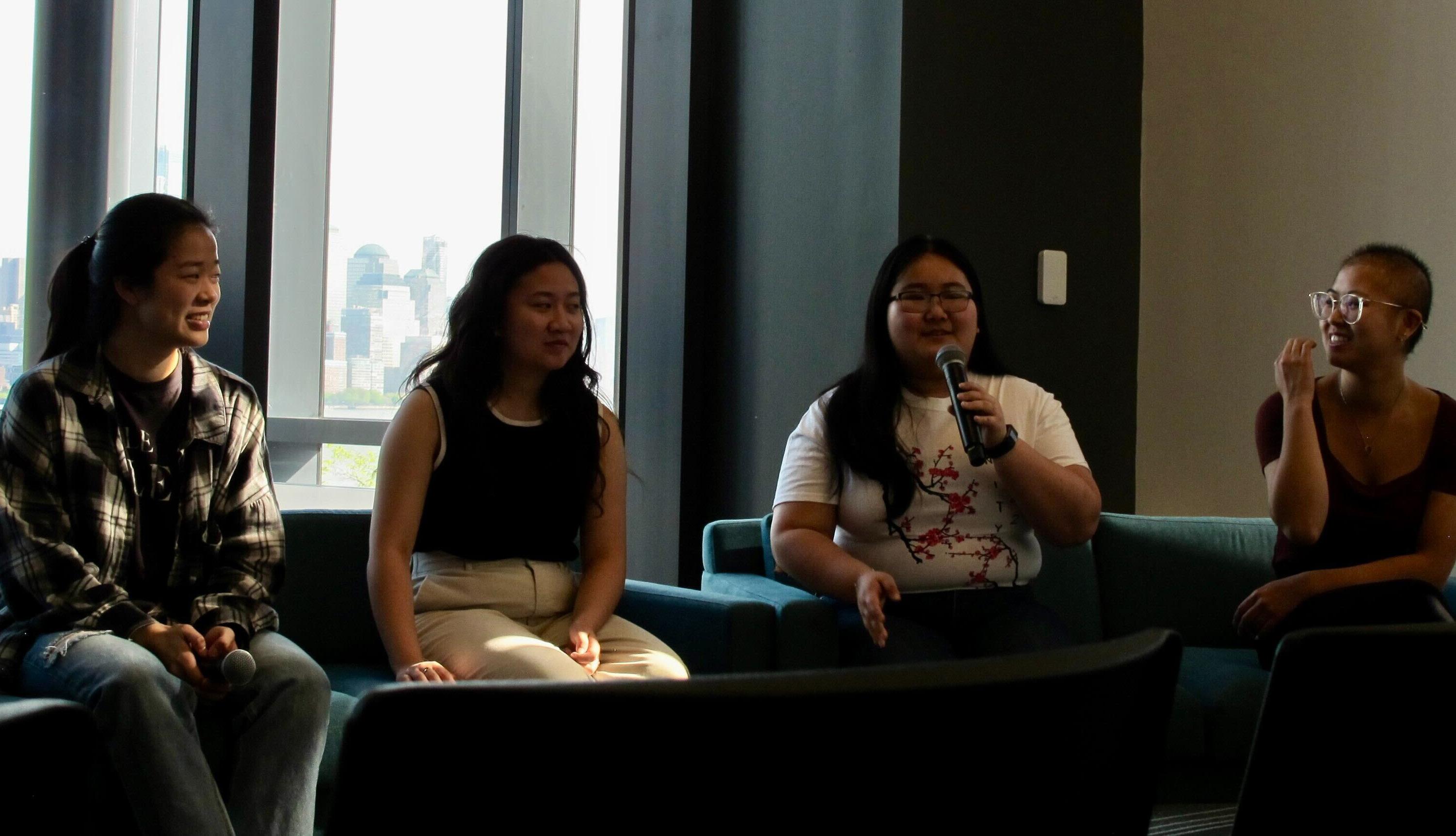 BY AVA WANG, MANAGING EDITOR
BY AVA WANG, MANAGING EDITOR
Asian American Organizing Project, “The new term APIDA is one attempt at de-generalizing both the terms Asian American and AAPI. It does this by specifically highlighting the inclusion of folks with Desi (South Asian) ancestry within the community. It is a similar concept as BIPOC in relation to POC.”
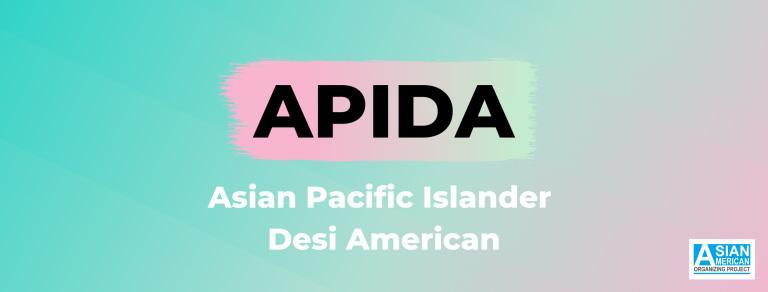
While APIDA does have some of the same issues as its predecessors, such as being too broad and potentially erasing the experiences of specific communities, its usage is still regarded as a step in the right direction towards inclusivity.
The University of Wisconsin-Madison’s Inclusive Language Series notes, “To fully understand these acronyms it’s important to remember that they reference a diverse population of more than 20 ethnic groups living in the United States. When referring to folks in the APIDA community, you should use the most specific language available. If you are referring to a large group of people of varying ethnicities within the APIDA umbrella, using the acronym is appropriate. When referring to individuals, or specific ethnic communities, you should avoid using the acronym and instead opt to use their specific ethnic identifier.”
When celebrating the many cultures and traditions of APIDA Heritage Month, it is important to recognize the complexity of this month’s name and its broader representation of the Asian American and Pacific Islander experience when it comes to being identified. There is a lot to learn from these diverse communities and some places to start are looking through resource guides, attending local events, and making an effort to reach out and ask others about their experiences and perspectives at such events.
The Stute recently had the privilege of attending the Reflections of the Asian American Experience event, facilitated by the Assistant Director of Counseling, Dr. Ying Xiong, and the Director of Undergraduate Student Life, Dr. Leo Pedraza. During the April 21 event, the student panelists and facilitators led attendees through a guided discussion, exploring the topics of intergenerational trauma, shared experiences, and joy. Conversations surrounding these complex themes were introduced through three critically acclaimed movies starring Asian leads: Turning Red; Everything, Everywhere, All at Once; and The Farewell
The student panel discussion was led by Stevens students Justin Gabriel, Joyce Lin, Stacy Shang, Alexandra Wong, and Stephanie Yeung. These students are affiliated with the Filipino Association of Stevens Institute of Technology, the Office of Diversity, Equity, & Inclusion, Counseling and Psychological Services, the Chinese Student Association, and Sigma Psi Zeta Sorority, respectively. The student panelists were well spoken, and their passion for sharing their voices and experiences as an Asian American was infectious. Discussions ranged from wanting to get rid of your ‘panda’ (your messy side) like Meilin in Turning Red, to how Evelyn Quan Wang in Everything, Everywhere, All at Once can provide insight into a parent’s point of view. The acclaimed films were used as icebreakers to dive into topics, such
as how individual values oftentimes contradict collective or familial values, and how the intensity of these values varies depending on how many generations ago your family immigrated.
Each panelist showed immense strength in their willingness to start difficult conversations surrounding taboo topics. Their vulnerable and heartfelt stories opened a door for everyone present in the room. It was inspiring to see the room open up as audience members increasingly began to share their stories, jumping in to confirm and validate the experiences of others. Dr. Xiong and Dr. Pedraza undoubtedly succeeded in facilitating a welcoming and understanding space. It was refreshing to hear both students and faculty discuss personal experiences about a shared culture with such honesty.
The event concluded with a hopeful discussion of how to break the cycle of unhealthy intergenerational trauma, and finding meaning while still loving and celebrating the best parts of Asian, Pacific Islander, and Desi culture.
A quote that I like from Children’s Rights Activist Marian Wright Edelman is that “You can’t be what you can’t see.” Representation of all cultures in all corners of life—media, workforce, academic faculty, and student bodies— matters. Thank you to the Asian, Pacific Islander, and Desi American Heritage Month for coordinating the event, and thank you to Justin Gabriel, Joyce Lin, Stacy Shang, Alexandra Wong, Stephanie Yeung, Dr. Xiong, and Dr. Pedraza for sharing your stories.
“YOU CAN’T BE WHAT YOU CAN’T SEE.” REPRESENTATION OF ALL CULTURES IN ALL CORNERS OF LIFE— MEDIA,WORKFORCE, ACADEMIC FACULTY, AND STUDENT BODIES —MATTERS.
WOMEN’S
Men’s tennis wins MAC Championships, ends regular season with 7-0 conference record
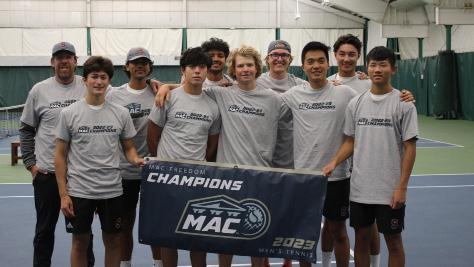 BY RUTHIE MULLISKY, SPORTS WRITER
BY RUTHIE MULLISKY, SPORTS WRITER
The Stevens men’s tennis team finished out their regular season with a bang, and proceeded to win the MAC Championships 5-0 this Sunday against FDU-Florham. The final match of the regular season played out on April 19 at the Stevens Tennis Courts, and it ended with a 9-0 shutout against DeSales University. This win secured their spot in the semifinal round of the MAC Freedom Tournament, where they won against King’s College with a 5-0 sweep, as well as securing the MAC Freedom regular-season title, with an impressive 7-0 conference record.
In the match against DeSales, the three doubles flights went in favor of the Ducks. At first doubles, sophomore Olof Persson and junior Aashi Kulakarni had an 8-6 win, marking their ninth consecutive win. At second dou-
bles, sophomore Vivek Harinarayan and first-year Max-William Kanz also won their ninth straight match with an 8-4 win.
Additionally, sophomores Sebastian Wroe and Troy Zhang had an 8-3 win at third doubles.
The singles flights followed suit, with just as much success as the double flights. At first singles, Kulakarni won with set scores of 6-0 and 6-1. At second singles, Harinarayan won with set scores 6-2 and 6-1. At third singles, junior Andrew He won with set scores 6-3 and 6-1, and at fourth, Kanz won with set scores 6-2 and 6-0. At fifth singles, Wroe won with set scores 6-3 and 6-0, and at sixth singles, first-year Timothy Lau won with set scores 6-1 and 6-0.
Following this match, the Ducks played in the semifinals in the MAC Freedom Tournament, played at Braddock Park in North Bergen, NJ on April 25.
Stevns defeated Kings College in
a 5-0 sweep, allowing the Ducks to advance to the MAC Freedom Championship.
Again, the Ducks won the three doubles flights. Persson and Kukakarni won at first doubles with a score of 8-3, increasing their winning streak to ten. At second doubles, Harinarayan and Kanz won with a score of 8-0, also bringing their winning streak to ten. Additionally, Wroe and Zhang won with a score of 8-0 at third doubles.
After such an impressive performance in the doubles flights, the Ducks only needed two wins in the singles flights to win the match, since the teams play the first to five. Wroe was able to secure a win at fourth singles with set scores of 6-1 and 6-0. At sixth singles, Zhang earned the winning point with set scores of 6-0 and 6-0.
After winning the semifinals, the Ducks advanced to the MAC Freedom Championship held on
April 29. The team is the twotime reigning conference champions, and this the program’s third-straight appearance in the conference championship.
In the championship matchup, the Ducks won all three of the doubles matches, including Persson and Kulakarni, Harinarayan and Kanz, and He and Zhang all winning by margins of 8-2. Only needing two more matches to clinch the championship title, sophomore Matt Luzzi locked in a victory by scores of 6-0 and 6-1. Lau earned the final point for the Ducks with victories of 6-0 and 6-0. Stevens had leads in three of the other four singles matches that ended unfinished.
This victory means that the Ducks have won every championship all three years that the team has been a part of the MAC conference. Up next, the Ducks will play in the NCAA Tournament, with all aspects of the match to still be determined.
Women’s Lacrosse has eyes set on the MAC Freedom title
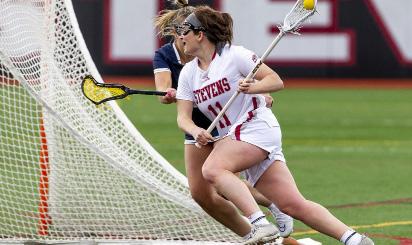 BY KAI WONG, SPORTS WRITER
BY KAI WONG, SPORTS WRITER
The Ducks’ eight-game winning streak came to an end this past Saturday, April 29, in their first MAC Freedom loss to Misericordia 10-9 after triple overtime.
Senior Zoe Cook led the Ducks with three goals on the day. Classmate Camryn Rogers and junior Emily Leiby each tallied goals and an assist in the game, while sophomore Emily Smart had three assists. Senior Juliean
Murphy added a goal and an assist and first-year Stefanie Sellitto scored a goal as well. Between the pipes, graduate student Lauren Cunniff got the start and made seven saves. Despite the loss, the Ducks clinched the number one seed in the MAC Freedom playoffs. Stevens will host the winner of Lycoming vs. Arcadia on Wednesday, May 3. Stevens beat both teams in the regular season, so the Ducks are looking to claim another victory and defend the MAC Freedom title.
The Ducks finished the regular season 15-2 overall and 7-1 in the MAC Freedom. Stevens had the same record in the MAC Freedom and made it as far as the second round when they fell to Salisbury 15-4 in the NCAA tournament in its previous, historic season.
As of now, No. 23 Stevens is also ranked fifth in Region IV in the NCAA Division III Tournament. Be on the lookout for live statistics and the livestream video on StevensDucks.com and cheer the Ducks as they look to keep their season alive.

STEVENS SCOREBOARD
WOMEN’S
MEN’S
BASEBALL Semifinal Series Location and Time TBA
WOMEN’S AND MEN’S TRACK AND FIELD MAC Outdoor Championship–Day 3 York, PA 10 a.m./11 a.m.
WOMEN’S AND MEN’S LACROSSE MAC Freedom Championship–Final Location and Time TBA
SUN, MAY 7
BASEBALL
James Webb Space Telescope sheds new, infrared light on the cosmos
BY KAYDEN CANNILLA, OUTREACH CHAIRSince the James Webb Space Telescope’s launch in December 2021, it has made dozens of discoveries that have expanded our understanding of the universe as it was developing. Webb has the capacity to look 13.6 billion light years distant, meaning the light emitted from galaxies at that distance would be 13.6 billion years old. In a paper published on April 13, 2023 in Science, University of Minnesota researchers found a 13.3 billion years old galaxy that has a uniquely high star formation rate surface density. On April 17, the James Webb Discovery website published an image of two spiral galaxies colliding. On May 1, water vapor was detected in exoplanet GJ 486 b, possibly indicating a planetary atmosphere in unlikely conditions.
The Minnesota discovery is the furthest back in history we have been able to see, 510 million years after the Big Bang, when galaxies were starting to form. “We’ve never looked at galaxies when the universe was this young in this level of detail. The galaxy’s volume is roughly a millionth of the Milky Way’s, but we can see that it’s still forming the same numbers of stars each year,” says Patrick Kelly, senior author of the paper. Galaxies of this size are difficult to observe in great detail because of how small and faint they are, but galaxy clusters, like RX J2129.6+0005, can act as gravitational lenses which magnify and extend the limits of a telescope. This effect allowed researchers to use near-infrared imaging to identify the candidate galaxy, designated RX J2129-z95, and confirm it using near-infra-
Stevens research develops new ferries for the Galapagos Islands
BY ERIN MCGEE, SCIENCE EDITORred spectroscopy. Galaxies at this distance have not been studied before, but measurements show a very high star formation rate surface density compared to observed galaxies of similar sizes.
Arp 220 has been closely studied for over 50 years and the advanced infrared capabilities of Webb can reveal new details about the colliding galaxies, by looking through the dusty regions and intense light. Arp 220 is the nearest ultra-luminous infrared galaxy to Earth and has a luminosity of over a trillion suns, compared to the Milky Way’s 10 billion sun luminosity. This intense light and the 5,000-light-year dusty region the collision is located in make it difficult to image, though Webb’s infrared imaging is able to show the diffraction spikes emanating from the cores of the galaxies.

In the search for habitable planets, GJ 486 is an unlikely candidate due to its surface temperature of 800 degrees Fahrenheit, though Webb’s discovery of water vapor may indicate the presence of liquid water. Near-infrared spectroscopy signals can all but confirm the presence of water, though at the moment it is unclear whether the water vapor is from a potential atmosphere on the exoplanet or from starspots, cool regions on the red dwarf star that the planet orbits. There has not been any observed evidence of starspots yet and if an atmosphere was confirmed, it would be the first rocky exoplanet to sustain these conditions.
The Webb telescope is the most advanced telescope in orbit, with stunning images and exciting information being published multiple times a month. A full list of James Webb Telescope Discoveries can be found on their website.
The Galapagos Islands, off the coast of Ecuador, is one of the most biologically diverse and historically important regions of the planet. In particular, it is where Charles Darwin found inspiration for this theory of evolution in the 1830s, while looking at the diverse array of animals and their variation from island to island. It is also home to a wide array of plants and animals, with a huge amount of biodiversity. In fact, many of the species of the Galapagos are endemic, meaning they are found nowhere else on Earth, including about 80% of the birds of the island, 97% of the land mammals and reptiles, more than 20% of the marine species, and more than 30% of the plants, according to the Galapagos Conservancy.
In recent years, however, the Galapagos have been under threat from a number of climate and environmental problems. Unregulated fishing, irresponsible transportation, climate change, construction, pollution, and invasive species are just some of the reasons for these issues, which have caused many of the native species of the Galapagos to be classified as endangered, threatened or even extinct. The most
notable case of this was the death of the last known Pinta Island tortoise (named Lonesome George), who died in 2012.

Many of these problems come from unregulated tourism to the islands. About 100,000 people visit the islands annually, causing concerns over the effects this has on the local wildlife, particularly the marine life affected by water travel. Currently, ferries are used to take tourists around the four inhabited islands, a practice that must be carefully regulated to avoid pollution. As the Harvard International Review says: “Ships that are not properly managed may contaminate the seawater with engine oil and paint flecks, which produces the concern of contamination of the ocean and drinking water supplies on the islands.” This, along with the threat of gas and oil spills, makes transportation a major concern for environmental experts.
Recently, in a collaboration with The Ecuadorian Government, Stevens students have worked on developing greener alternatives to the ferries that take visitors between the Galapagos islands. The team, which included Kate Killian ’23, Tristan Henningsen ’23, Zach Martis ’23, ocean engineering professor Raju Datla, and a team from Escuela Superior Politécnica del Litoral, an Ecuadorian
research university, worked on designing a new hull as an alternative to the current ferries. They developed a new twin-hull design, to replace the original single hull, which was tested and developed in the Davidson lab’s wave pool.
Currently, ferries in the Galapagos run on gas engines, which can cause environmental concerns. The Stevens team suggest two alternatives. The first would be to use hydrogen fuel cell technology, which would allow the boats to travel more quickly, but would be hard to implement. The second solution would be to use lithium batteries as a power source, which could be recharged at each ferry terminal, but would not travel as fast as the fuel cell powered engine. Both of these solutions are still being researched.
Beyond improving the environmental footprint of the ferries, the new design also makes the ride more comfortable. According to the Davidson Lab, surveys have reported that between 20% and 40% of the passengers of these ferries experience seasickness, particularly on winter journeys, when the seas tend to be more rough. As the team continues to test and develop a design for the new ferries, they aim to solve the variety of problems that arise with transportation in such a unique area.
research demonstrates ability to detect clinical depression through automated speech analysis
New
BY AVA WANG, MANAGING EDITORMental illness is a disease that packs two punches: first symptoms, then stigma. The stigma surrounding mental health — especially men’s mental health — only contributes to the struggles of those already suffering, and at its extreme culminates in 700,000 individuals lost to suicide each year.
Within mental health diagnoses, depression and anxiety are among the most common. Depression is a worldwide epidemic regularly overlooked due to the ‘invisible’ nature of its diagnosis and compacted by societal pressure to sweep it under the rug. The World Health Organization estimates 3.8% of the total population struggles with the chronic illness, totaling 280 million individuals worldwide. For reference, in the first two weeks of 2022, around 3.37% of New Jersey residents were considered active cases of COVID-19, which was profound enough to delay Stevens students’ return to campus for the Spring 2022 semester.
Raising awareness towards the significance of the number of individuals struggling, development of earlier detection methods, and advancements in the ease of access to treatment all progress efforts to curb the ongoing mental health crisis.
In December 2022, BMC Psychiatry published a groundbreaking study in early detection methodology. Alexandra König and
colleagues were able to predict if an individual had clinically significant levels of depression — with 93% accuracy — from a two minute speech analysis.
Until this publication, prior art for speech analysis and depression primarily focused on the comparison of patients already diagnosed with a major depressive disorder versus that of their healthy counterparts. The work put forth by the French National Institute for Research in Computer Science and Automation’s König is unique in that it brings knowledge from prior models and applies it to a non-clinical setting. König and colleagues successfully developed an analytical program capable of detecting early and sensitive markers of clinical depression in individuals with no previous clinical diagnoses.
It’s been widely understood that patients with depression may present with more monotonous speech, less expressive rhythm and intonation, and utilize more words between pauses. Clinicians and practicing psychologists have been analyzing the speech of their clients for years. It is unsurprising, however; that this subjective form of evaluation, whether conscious or unconscious, is often unreliable and hard for a clinician to quantify. It takes years of professional experience to train the ear to these subtle differences. König’s team’s 93% successful identification rate defined the length of a pause to be a mere 10 milliseconds.
Computational analysis of speech in depression-prone patients presents a significantly
more objective pathway to diagnosis and treatment. The ones and zeros dialect of computers translates beautifully into temporal measurements and is very conducive to reading between the lines with less of an emphasis on the very human desire to understand and empathize with semantics. The study’s evaluation was rooted primarily in the number of words participants utilized between pauses in speech. Additional acoustic and segmental features such as pitch, speed of speech, and length of speaking segments also informed the prediction.
While a computer may excel at quick detection, its ability to develop individualized treatment plans crafted to the patient’s unique struggles falls a bit flat, and is best left to a practicing psychologist. A program such as König’s is perhaps most effectively used as a tool to screen individuals, and minimize the time clinicians spend screening. Non-clinical detection methods shorten the agonizing wait for counseling by maximizing the time clinicians can spend practicing. Quick, emotionally non-invasive, early detection methods such as this study’s analytical model provide the promise of a future where individuals struggling with depression spend less time facing their health struggles alone.
Until early screening methods such as König’s become more mainstream, I urge you to work on becoming part of the change to destigmatize mental health.
This article was originally published on 2/3/2023
The death of intellectual curiosity
BY NICK SMITHA new virus is plaguing academia; American consumerism. Academia has changed immensely in the past few decades. There is no hiding the exponentially increasing price tag affiliated with a college education. Throughout the 1980s, public funding directed toward higher education decreased and the development of the American university began to be seen as not only an education, but an experience. Universities today boast about their beautiful dorms, on-campus facilities, and vibrant campus life. While the development of a living-learning community is an essential part of being in college, why do we know so little about the academic achievements and the groundbreaking research that happens at the institutions we attend?
Universities throughout the United States are spending record amounts of money to keep their campuses looking pristine and expanding their admissions and marketing departments to make sure everyone knows about their brand-new gymnasium. At Stevens specifically, the University Center Complex was unveiled last spring, a very costly project that has drastically changed the culture of our campus in less than one academic year. Stevens is making record investments in the way that students live at Stevens.
However, at the same time, we do not even have enough professors to meet the demands of students.

Multiple faculty who will remain unnamed at this university have expressed their frustrations with not having enough time for research, teaching too many course sections, and a drought in financial resources to fund research projects. This is not exclusively a Stevens issue. Universities around the country feel similarly, and professors are openly expressing such concerns. It does make us reconsider the question: what is the goal of an academic institution? Benjamin Disraeli said that “university should be a place of light, of liberty, and of learning.”
I agree with this, and I urge people to reflect upon whether that is the case today.
The university system does not reflect what it once was. Admissions departments are now the deciding factor in what deems an institution “prestigious,” parents have indoctrinated their children with the idea that American education must have a fiscal return wfailing to collaborate to improve the current state of the university system.
Education scholars have identified three main pillars for academic performance and success: intelligence, effort, and intellectual curiosity. Intellectual curiosity is
simply defined as curiosity that leads to acquiring more knowledge. In recent years, this pillar has been neglected by American universities. Admission to an academic institution has become solely based on achievement. The evaluation of achievement has stripped students of the belief that curiosity is what drives learning. All undergraduates at Stevens submitted their historical grades, test scores, and essays about their identity, but why do we leave out asking what students want to learn in this next stage of their lives? The idea of college is less about what you want to do and more about what you want to learn. Instead, there has been a shift towards schools boasting about their starting salaries and prestigious job placements. We have precariously ignored the fundamental role of learning. This is a problem. How are we to learn without wanting to learn? Admissions departments care so much about what we as students have done historically rather than evaluating how much we want to learn. Admissions departments today care more about demonstrating aptitude in courses and on standardized testing, but I do not believe this evaluates knowledge and intelligence in its full capacity and it completely fails to assess how curious an individual is and will be. We have stopped asking “why?” in education, and it is setting a dangerous precedent. This includes unengaged classrooms, professors tasked with attending more to students than research despite exam difficulty decreasing, workloads at universities continuously decreasing over time, and a student body that is unwilling to experience intellectual struggle. It prompts me to ask the question of whether admissions departments and professors have the same objectives for the admission of students.
Last year a highly regarded New York University (NYU) professor was discharged because of the difficulty and rigor of his chemistry course. Students taking the course reported to the university that the course took up too much of their time. Underperforming students also said that the grades they received in the course hindered their ability to get into competitive medical schools. 84 of the professor’s 350 students signed a petition in protest of the professor. This petition was submitted to the administration and effectively led to the dismissal of the professor. There was a counter-petition on behalf of the faculty member that advocated for keeping the professor which included signatures from over 20 professors in the chemistry department.
Why were those 84 students enough to dismiss an

incredibly accomplished academic? It feels as if universities have begun to fear students. This is the transactional culture academia has become and it is derived from the consumer view of education. When students feel they are not getting what they pay for, they speak up, which in some cases is valid. However, we can not discount the fact that students are advocating for easier courses. Professors have the academic freedom to choose how their students are evaluated. Students are an integral part of a university, however, they should not dictate decisions that threaten the academic ecosystem and I shame NYU for this decision.
There is an unwillingness on behalf of students to struggle in the classroom and I do attribute this to the pressures of having a strong career that leads to the disregard for learning at the university. I do not blame myself and other students as we are the victims of a vicious system that has ruined the glory of academia. This system has stripped us of the ability to be intellectually curious and encounter the struggle I am advocating for. Greek philosopher Isocrates once said, “The root of education is bitter, the fruit is sweet.” Students must struggle to learn, and we have let go of this principle. Education is hard but learning is rewarding and when external pressures inhibit a student’s ability to learn what even is a college?
The systemic flaws run deep beyond admissions.
Mark Edmundson explains in Why Teach that the infiltration of American consumerism in education has led to students being the consumers of a product. At the end of every semester, we basically give our professors a Yelp review as we would our local ice cream parlors and while the review is necessary and essential for feedback, these decisions are being used as one of the main deciding factors in whether faculty are hired, granted tenure, or given prestigious titles. It is commonly known that students notoriously rank more difficult professors lower in evaluations, and rank more likable and easier instructors higher than their more challenging counterparts.
How can we rely so strongly on metrics that will decide the careers of our academics when students fail to recognize and attempt to avoid intellectual struggle which is essential to learning? Students have become the deciding factor in some cases for instructors and we are leaving the fate of research at our institutions in the hands of undergraduates. Power must be redistributed back to the faculty. There is too little focus on curiosity and research contributions on behalf of the faculty.
BY QUENTIN JIMENEZIn the early 20th century, Germany was a bastion for civil and LGBTQ rights, being what most consider the birthplace of the modern gay rights movement. This was spearheaded by the Scientific-Humanitarian Committee (SHC), the first organization ever to fight for the legal equity of queer and transgender peoples. For 30 years, they established libraries, printed newspapers, and made Germany the first place where homosexuality could be de facto allowed. They pushed Germany’s culture forward, increasing the acceptance and education of and about LGBTQ people.
This lasted until January of 1933 when the Nazi party took control of power, where they immediately began attacking their enemies along cultural lines. By February, the party began forcing gay bars and “homosexual spaces,” to close, with almost all barred by the end of the year. By March, the party was collecting and burning any magazines or books related to homosexuality, and by May had raided the library of the SHC, destroying over 12,000 books and the buildings that housed them. By 1934, the Nazi party was purging itself of alleged homosexuals, and by the end of the year amended a law to make it easier to incriminate them. By 1935 they had set up the concentration camp system for arresting, enslaving, and executing their enemies, including the LGBTQ.
And still today, after all we know about history, there are many who believe that committing the same mistakes as the past is what will lead us towards a brighter future. More now than ever do we see this doublespeak and ambiguity that persisted in Nazi rhetoric and policy mirrored through the words and actions of American politicians.
There is probably no better modern day microcosm of this than in Florida. Not only did the legislature pass a “Don’t Say Gay’’ bill, it is also the state with the 2nd highest rate of book bans, and home to a Governor actively “waging a war on woke.” This war, and the bills that have come out of it, have created a chilling effect across the state, preventing LGBTQ communities from representing themselves how they wish, while emboldening the conservative movement and echoing Nazi and fascist tendencies.
This chilling trend has led to the cancellation of many LGBTQ focused events, particularly drag shows and parades. Although not a law yet, many fear that the ambiguity of the statute will allow authorities to shut down LGBTQ events at will. This is not the only concern in the state however, with many school libraries remaining empty as administrators rush to certify that every book in their collection is up to the state’s new standard. This process often forces educators to remove any book containing LGBTQ characters or themes, themes of racism or activism, or any sexual content.
Though we have not made it to the end of the slippery slope, we are definitely well on our way downwards. Even though there are no politicians explicitly calling for the systematic extermination of LGBTQ peoples yet, they are more than okay with implementing vague policies which do the same. Even outside of Florida hate like this continues to persist, such as Gianforte’s (yes the same one) successful efforts in Montana to ban gender-affirming medical procedures, even after his non-binary son pleaded with him not to.
Although they may not yet say it directly, their goals are clear, a conservative American future has no place for the LGBTQ. The doublespeak that exists in the conservative movement allows them to deflect and pass blame, insisting we are the ones making assumptions about their goals. It is no longer an assumption, the actions politicians like these have taken and will continue to take are unequivocally actively endangering the lives of LGBTQ youth in America.
The first step to recovery is admitting when you have a problem, and it is time for America to admit that we have a problem. Only once we reflect on the challenges we currently face and the history that has led us here can we begin to start making change for the better. If we continue to burn the evidence of our past and let fear and hatred rule our present, we will be doomed to repeat our mistakes in the future.
They want you dead, they just won’t say it
THE STUTE EDITORIAL Just do it.
As the semester comes to an end, we are all faced with the daunting task of final papers, presentations, and exams to complete before we can get to our summer plans. It’s time to buckle down, put in the work, and finish strong.
At this point, it’s very common to feel overwhelmed with the group projects we need to coordinate, exams to study for, and papers to write. While some may thrive on being busy and productive, it’s important to remember that others may find it stressful. We need to be empathetic towards each other during this time, understanding that everyone has different levels of workload and different ways of managing stress. During times of stress, it’s easy to fall into the trap of the “struggle olympics.” This mindset of comparing yourself to others based on the amount of work or stress they’re experiencing to see who has it worst. Stevens is a rigorous school and the back and forth
of “I’m taking 20 credits” and “well I’m taking 20 credits and doing a part time job” is not only unhelpful but can be harmful. Instead of comparing ourselves to others and one-upping each other, we should be supportive in struggling together, no matter the amount.
As we push through this final stretch, it can be helpful to adopt a mindset of perseverance. My good friend Chloe shared the idea of getting through a tough week out of spite. It’s essentially the mindset that you have to get through the week so that the invisible supernatural forces that want you to fail can’t win. It’s a humorous approach, but it can serve as motivation for people who are competitive and need a force to work against. This is similar to the perspective that Ava, The Stute’s managing editor, wrote about in her article “I bet you can’t” She talks about the concept of hypocrisy-induced cognitive dissonance and how when someone tells you “I
MIND OF A FRESHMAN Goodbye little one
be fair to say that everything was all sunshine and rainbows, because in reality it never is like that. You need the rain to make the rainbows, and you need the clouds to make the rain, but the clouds also eventually part ways to give their spot to the sun and remove the haze.
BY TANISHKA KAPOOR ‘26Oh boy, does time fly. I know it’s cliché to say “it seems like the year just started yesterday,” but it’s kind of fascinating how one can fail to realize the actual value of time until it has passed. Each second, each minute, each hour of each day was filled with memories that I will treasure until they eventually begin to fade away, only to be brought up again by every picture, every video, every movie that I know I will look at whenever I feel even a bit gloomy. There were so many memories that defined time better than any number or clock ever could. Fall was the season of excitement but hesitance, winter was filled with festivities with a tinge of loneliness, and spring brought some new hope with a sense of rejuvenation. Sure this year was filled with some of my happiest times, but it wouldn’t
Another year passed, yet it was not just any year. It was the year when I took my first steps into college — a unique blend of happiness, mental breakdowns, independence, and a bunch of academic takedowns. College was my fresh start. A place away from my comfort zone, high school miseries, and controlling memories. Maybe it was my naiveté of thinking that independence was a new lesson that was only filled with excitement and happiness. But I guess it wouldn’t be a lesson if it didn’t involve some bewilderment and messiness.
As Forrest Gump said, “Life is like a box of chocolates, you never know what you are going to get.” I don’t really like chocolates, but I used to love thinking about how my visions could be met. Could’ve been, would’ve been, should’ve been. The past can’t be changed, and the sheer amount of possibilities for the future can drive
bet you can’t,” that can be a powerful motivator to prove them wrong. You can use this as a mechanism by telling yourself or even other people that you will get something done and holding yourself accountable to that.
In all seriousness, let’s not forget that during this time, it’s important to take care of ourselves. There are plenty of mental health resources available to you like CAPS, destress activities sponsored by the school, and your own personal coping mechanisms. It’s crucial to prioritize self-care and make time for things we enjoy. Whether it’s going for a walk, treating yourself to your favorite meal, or spending time with friends and family, taking a break from studying can help us recharge and come back stronger. Scheduling in fun can sometimes feel like a chore and just another thing on your to-do list, but try to prioritize what feels right and listen to your body. It’s important to make time for meals and
you completely insane. It took me time to stop myself from thinking about “what ifs” because the truth is that there really isn’t any end. The first year put me in situations that I couldn’t predict, forced me to face things that I tried so hard to escape, and taught me how to be okay with not being able to foresee every little thing about every significant day.
Unpredictability is synonymous with people. I could talk about them all day, all night, even on rainy days when their presence in my mind would make everything especially bright. My dad told me that life is like a moving train. People get on and get off, some leaving soon after they came, and some staying way longer on the train. The people that came and went taught me so many things, and the ones that are still here with me continue to enlighten me through this journey.
The journey may be long, but every train makes stops along the way. I want to think of this first year as one of the many stops from which I inevitably have to part ways. So, as much as I will miss it, I wish farewell to this column with hopes of making a path for the next thing in this perceived progression.
Finishing what was once started
BY OFF CENTER
- SATIRE -
As the author sits now to write his final Off the Press article, it seems an appropriate time to reflect on the importance of finishing what we start. For example, if you start eating a box of pasta for dinner, you should finish it. Even if you finish it all in one sitting. The author speaks from experience last week. Some other things that finished what they started include Jacobus and Hayden Halls, the latter of which the author was among the final residents. They started by being built and finished by getting torn down. The sleeve of Oreos in the cabinet started by being eaten and ended by being
eaten three minutes later. The author’s career at Off Center started with a tentative email about where the next meeting would be and ended with (and this is true) everyone on stage saying “F*ck you Matt” in unison. It made sense in context and indisputably came from a place of love.
Starting and finishing are less applicable in the field of motor racing. The announcer always says “Start your engines” at the beginning, but the engines don’t finish. It’s about cars crossing the finish line.
So this is one field where it may not be a priority to finish what you started as much. You can start an engine and finish a race, and you can start a race, but you can’t really finish an
engine. Unless you were building it.
Now, the author needs to find some other things to talk about here because the finishing-what-was-started motif isn’t going to quite fill the box. So Off the Press would like to announce that we are forming a secret news journal. It’s just like Off the Press, but secret. Secret journalism — so secret that no one reads the articles. In fact, we’re not even sure people write them. It is a secret after all so it’s not like we can go around asking.
The author is also going to take some time here to address suspicions that have flooded our office recently accusing our articles of being “staged” and “written out ahead of time.” We
sleep first, and then squeeze in some fun if you can.
As I’m writing this editorial and submitting it a couple of hours late (sorry Evan!), I may be actively avoiding thinking about the four presentations I have to give in the next 36 hours.
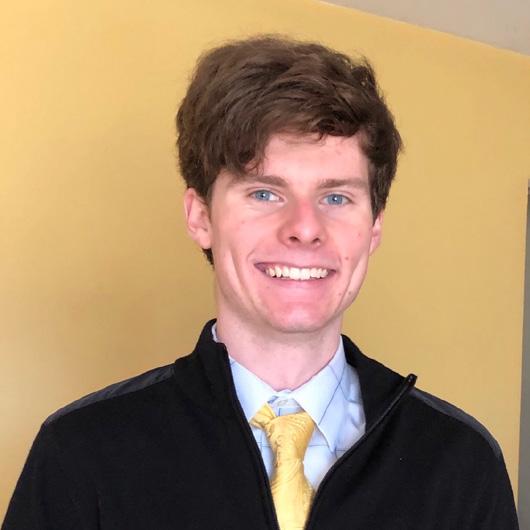
However, I know in the end I’ll get it all done and so will you.
Let’s encourage each other to finish strong, take care of ourselves, and remember that we’re all in this together; yes, that is a High School Musical reference. We can support each other by checking in, offering help, and practicing empathy. We can remind ourselves that we’re all incredibly capable and that we can succeed if we put in the work. And most importantly, let’s remember to take care of ourselves and prioritize our mental health and well-being. The end of the semester can be stressful, but it’s also a time to celebrate all the hard work we’ve put in. Let’s finish the year strong and just get it done.
SENIORITIS Tradition & change
And yet, our experiences as the Class of 2023 are profoundly different from the Class of 1923, or even the Class of 2013.
Isabella Ziv ‘25 Editor-in-Chief
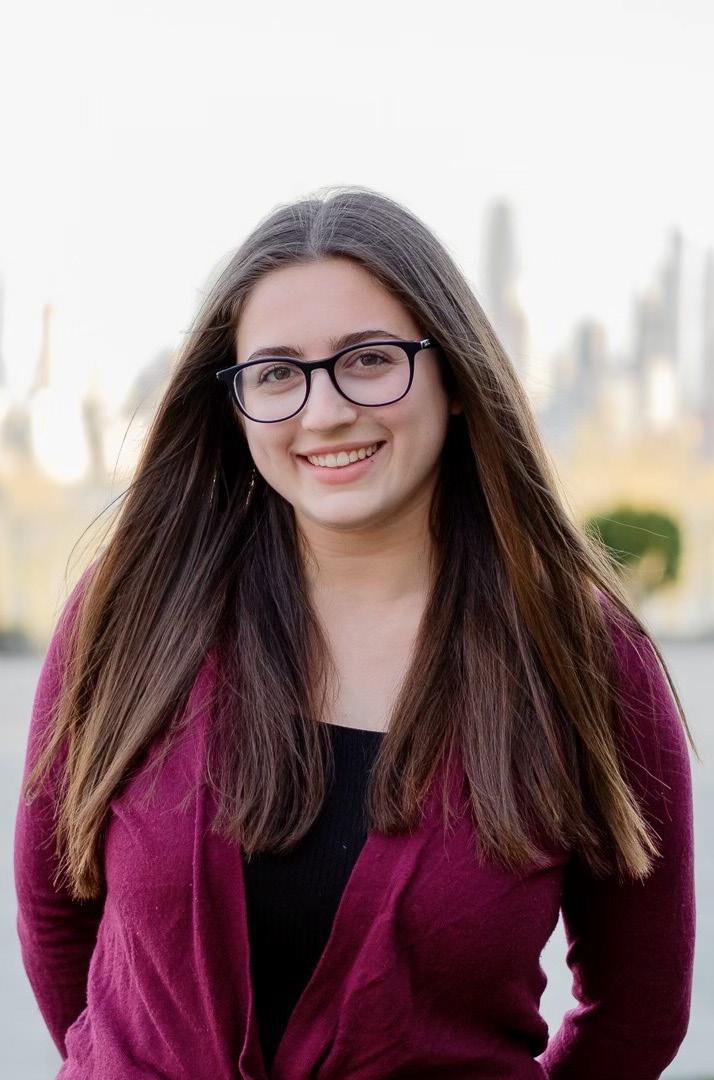
to enter it. This increasing unpredictability can make things start to seem like one huge game where the rules are stacked against us.
BY CHARLES BEALL ‘22Yesterday, graduating Stevens students took part in the Wittpenn Walk, a long-standing sendoff-type event leading up to Commencement later in May. Since Wittpenn Walk was a construction zone when the class of 2023 started at Stevens, most of us did not have the firstyear experience of walking down this pathway, as many classes before have done. But nonetheless, it was a nice way to celebrate the upcoming Commencement in a place central to the Stevens campus (Commencement itself will be at various off-site locations in Newark).
What has struck me at these types of events over the past year has been their combination of tradition and change. Several classes of Stevens students took part in similar or even very same events happening for another year now.
It is important to find a balance between tradition and change in life as a whole. Having no traditions at all would lead to complete chaos, which, if you’ve read some of my For Math’s Sake columns this past year, you’ll know is incredibly hard to deal with! But clinging to a rigid set of traditions or routines leads to a stagnancy that only change can combat.
My fellow seniors and I will soon be in a world where we’ll have to get used to new traditions, and also initiate or adapt to lots of changes. For one, our daily routines will likely look vastly different, either having nine-tofive jobs with the evenings free, adjusting to graduate coursework, or finding new hobbies and activities to do in our free time. The workplaces and communities we find will have their own set of traditions, while also trying to adapt to new advancements or setbacks.
We have seen much change over the past four years, and it seems like the world is changing ever more rapidly as we prepare
It is very tempting to cling to traditions and routine at these moments, but what has been beautiful about my time at Stevens is seeing how excited people are to embrace and lead change. The questions that we ask in class, the problems we solve in projects, and the impacts we make on campus life — all have come from a desire to change rather than stay the same. This is something that I’m confident my class, and future Stevens classes, will continue in the future.
So, as Commencement approaches, I feel happy knowing that, even with these traditions in place to provide us some comfort and consistency, we are still unafraid to go out and make a change. And for the people in future classes whose Commencement is still a ways away, keep up the good work in making changes here. At the end of it all, you’ll have people cheering you on at Wittpenn Walk and the other traditions, reminding you that hard work deserves its due amount of celebration and comfort.
want to state as we always do that we adhere to the highest standards of journalism, so yes, our articles are written before they are published. They are meticulously researched and planned out, and then the author thinks it would be interesting to write about something else and improvises a tangent for the entire article. So the rumors are kind of true. The author’s favorite organic molecule is Butane. This is important information for the rest of the article and is essentially journalistic foreshadowing. Just keep it in mind. It’s really important for readers to pay attention to what they’re reading. Otherwise, they might start reading something and
then get lost in the middle. Then they would have to read it again but get lost again, thus creating an infinite loop. This is, of course, bad.
In this penultimate paragraph, the author would like to thank the many good people at Off Center past and present for improvising sketches and sketching out improv in advance many a time over the years. A pleasure to share the stage and cross up, it truly was. I wish the next semester’s club the highest levels of hilarity in rehearsal and performance. The Texas Knights are brimming with suggestions.
Back to finishing what we started. It would be really bad if
Opinion
Is Ultimate Truth an Equation? Nah.
wrote in The Character of Physical Law, “it is difficult to get across a real feeling as to the beauty, the deepest beauty, of nature.” But here’s an irony: Feynman’s comments on quantum physics contradict the claim that mathematics illuminates nature.
My friend, Richard is a curmudgeonly physicist, who sends me science-y things he finds online. Richard loves making the point that if you don’t understand something mathematically, you don’t understand it. This claim bugs me, perhaps because I studied literature in college and teach humanities here at Stevens. My rebuttal follows.
BY JOHN HORGAN CAL PROFESSORRichard is in fancy company when he contends that the deepest truths are mathematical. Pythagoras and Plato both implied as much, and Galileo famously wrote that you can only read “the grand book of the universe” if you understand the language in which the book is written: mathematics. In 1931 James Jeans, a British physicist, proposed that “the Great Architect” of the universe, that is, God, “seems to be a mathematician.”
Richard sent me the Galileo and Jeans quotes, plus similar comments from physicist Richard Feynman. “To those who do not know mathematics,” Feynman
In a book on quantum electrodynamics, which he helped formulate, Feynman reiterates that you can’t comprehend quantum theory without the math. But he adds that you can’t understand it with the math either! “I don’t understand” quantum physics, Feynman confesses. “Nobody does.” He suggests that physicists’ advanced mathematical “tricks,” although they make calculations easier, can obscure what is actually happening in nature.
Also, if God is a mathematician, in what dialect does She/He/They/It speak? Quantum phenomena are described with differential equations, matrices and path integrals, a method invented by Feynman. Each of these dialects employs imaginary numbers, which are constructed from the square roots of negative numbers.
Moreover, quantum theory accounts for electromagnetism and the nuclear forces, and general relativity describes gravity. Quantum theory and general relativity are conveyed in radically different lingos that are hard to translate into each other. Some physicists still
NOT FINANCIAL TIMES (NFT)
Bud
dream of a unified theory, possibly embodied in a single formula, that describes reality. That is the theme of Michio Kaku’s recent bestseller The God Equation: The Quest for a Theory of Everything. But Kaku’s vision of a mathematical theory of everything seems increasingly quaint, given all we’ve learned about the limits of mathematics. In the 1930s, Kurt Gödel proved that all but the simplest mathematical systems are inconsistent, posing problems that cannot be solved within the axioms of that system. Extending the work of Gödel, mathematician Gregory Chaitin points out that mathematics, rather than being a unified, logically consistent whole, is riddled with randomness, contradictions and paradoxes.
Philosopher Bertrand Russell, early in his career, revered mathematics, which he thought is our best route to “absolute truth.” Toward the end of his life, perhaps because of the influence of Gödel, Russell arrived at a darker view of mathematics. “I fear that, to a mind of sufficient intellectual power,” he wrote, “the whole of mathematics would appear trivial, as trivial as the statement that a four-footed animal is an animal.”
That’s far too bleak a view. If mathematics reduces to a tautology, 1 = 1, it is a fantastically fecund tautology. Mathematics has led to countless intellectual, aesthetic and materi-
Light’s big bold blunder
leading to two of Anheuser’s top marketing executives placed on leave.
BY JOSEPH AMES ‘22First, to preface everything, this is by no means a political piece. The entirety of this column is dedicated to business. This, however, is one of those prominent intersections between profits and politics.
With the elephant out of the room, let’s dive into a timeline and context of the event in focus. Everything began back in mid-March when popular transgender journalist Dylan Mulvaney’s one year of transitioning was documented through the 365 Days of Girlhood event. In the past, Mulvaney had become very polarizing due to a very publicized transitioning journey via social media, so the special put an even larger target upon Mulvaney’s back.
In response to the event, Anheuser-Busch sent Mulvaney personalized cans as well as featured Mulvaney’s Instagram for a targeted advertising campaign.
The fallout has been immense and well-vocalized from both sides of the political aisle—including a Republican-led boycott of Anheuser Busch products, mainly Bud Light—have resulted in a 17% decrease in sales during the week ending April 15 compared to the previous year’s metrics,
Now, for the million-dollar question: was the move by Bud Light to market through Mulvaney intelligent? Simply put, no—the move was a calculated manipulation of an individual’s identity politics to push a product into a new market that the company had previously been unsuccessful in marketing to.
The intentions of Anheuser were quite clear, as stated by their Vice President of Marketing at the time, Alissa Heinerscheid, that the brand needed to shed its “fratty” branding with “inclusivity” in order to appeal to younger generations. Heinerscheid doubled down on the need to change Bud Light’s image, emphasizing the necessity for a shift towards a more gender-neutral product rather than the current marketing focus on males.
With respect to Heinerscheid,who has been very successful and has a strong Harvard education to bolster her name, the move was poorly thought out and disregarded a large reason for the brand’s reputation: preference. A 2007 study by Beverage Dynamics found that almost 60% of light beer drinkers were males—with the largest age groups being made up of the late-20s and early-30s. The discrepancy only worsens when it comes to other types of beers such as dark brews and imports—with the gender split rising closer to 66% male preference and the age grouping only further compounding into the late-20s and early-30s.
al advances, on which our civilization depends. But mathematics, like ordinary language, is a human invention, a powerful but limited tool, not a divine gift. Many mysteries resist mathematical analysis, especially those related to the human mind. And some great scientific advances have been non-mathematical. Charles Darwin’s On the Origin of Species does not include a single equation.
For all these reasons, we should doubt physicists who say that truth must be expressed in equations. Physicists would say that, wouldn’t they? That’s like a poet saying that truth can only be expressed in meter and rhyme, or an economist saying that everything comes down to money.
Back for a moment to my grouchy pal Richard. Although a math-o-phile, Richard does not share the belief of Kaku and others that there is—must be!--a single, true mathematical description of the world. Richard adheres to a position called theoretical pluralism. There can be many ways to model nature and to solve a scientific problem, Richard says, and insisting that there must be one correct way can impede scientific progress. On this point, Richard and I agree.
John Horgan directs the Stevens Center for Science Writings. This column is adapted from one posted on johnhorgan.org.
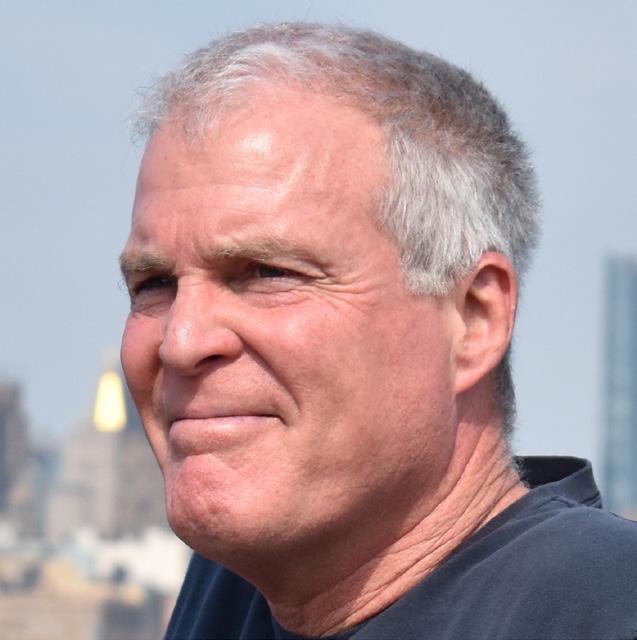
K n i t t i n g &
D e s t r e s s i n g
Join Student Life from 2-3pm on Wednesdays in the UCC commons to relax with yarn and tea
ADVICE TO BROKE COLLEGE STUDENTS
The season of savings
When it comes to politics, a 2014 study featured in the Washington Post found that Bud Light was very politically agnostic compared to the more liberal-leaning Budweiser and conservative-leaning Coors Light.
The move to position Bud Light to be a more aristocratic, egalitarian beer simply just does not make sense. Beers typically are not the drink of choice for that demographic, who opts more for single malts or wines at higher levels of affluence and seltzers at lower levels. For Bud Light to try to position itself within that group does not prove to have much upside. Anheuser would have benefited more from pushing into the seltzer market more, as its only current standing is Bud Light seltzer, which has had its own struggles, largely due to its association with Bud Light.
Moreover, while the push for inclusive marketing has been successful in the past — see Nike and Colin Kaepernick or M&M’s growing female “spokescandies,” which have been less abrasive to the target audience. Here, Bud Light was directly pressing their market where it hurts, and the market pushed back. While it remains to be seen if the outcome will be longstanding or if this is simply a hitch in the journey of Bud Light to modernize its brand and reach new audiences.
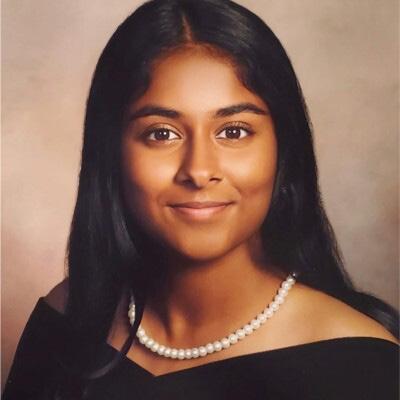
On the positive side of things, Bud Light does notoriously taste like week-old rainwater, so the boycotts are opening doors for Anhauser to push some of their more refined products into stores in the future.
BY HIMA THUMMALA ‘26As the month of May has approached, it means that there is less rain and more sunshine. Fewer exams and more summer jobs. Fewer trips to classes and more trips on vacation. Summer is in bloom, making it a time that is meant to truly be enjoyed.
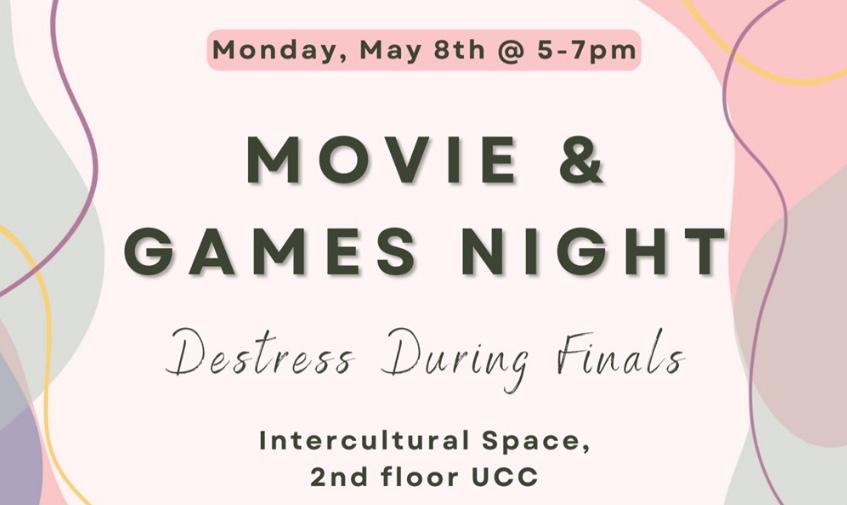
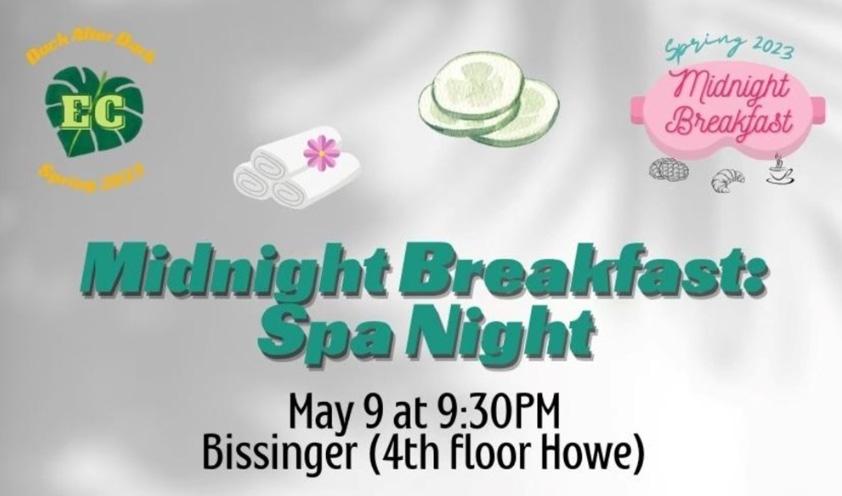
But often having to venture out and find a source of income to live a stable lifestyle can intrude on your summer fun. This is especially applicable if you are not reliant on your parents/ guardians financially.
But on the bright side, it can be easier to gain wealth over the summer than the college year as you have more time to prioritize your finances along with your education.
Paid internships are an effective way to do this. Although they can be difficult to acquire, these opportunities can provide you with the chance to not only get real-world experience that can help elevate your career but can also raise the numbers in your bank account.
Additionally, investing your time in getting a job
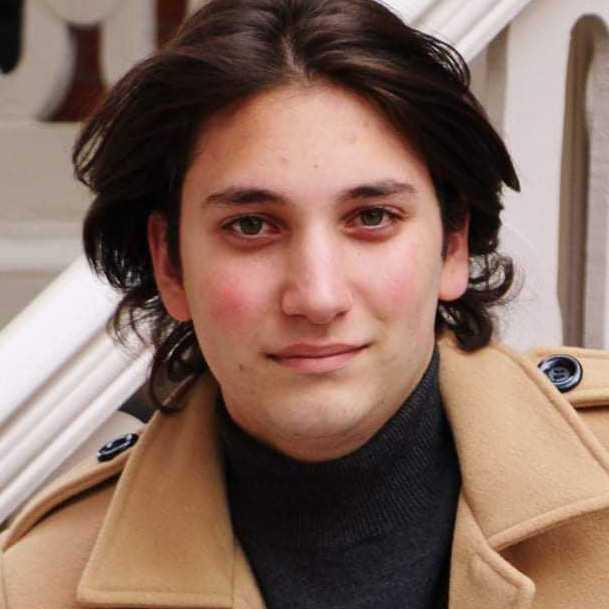
could be beneficial to improving your finances as well as your professional skills. Depending on what career path you would like to go upon, consider choosing a summer job that correlates to it. This will give you the expertise of experienced workers as well as a chance to see what it would be like to pursue that field in the real world. For example, if you are pursuing an engineering career path, work as a tutor or mentor for younger kids to educate them on the importance of engineering. At the end of the day, gaining experience from which you can grow from, while also making money, can ultimately result in the most benefits to ensure career success and financial stability.
Furthermore, if you are unable to make money through an educational summer experience but are still able to afford however much it is costing you, it does not mean that you should not go for it. It is crucial to remember that you are still investing in the skills that could eventually help you gain a higher salary in the future. For example, if you got the opportunity to work as an instructor at a summer coding program but were not getting paid for it, you could still use the professional skills you have gotten from it in the future. You can also put these experiences down on your resumé, instilling the potential opportunity for you to have a strong portfolio for when you apply
to future jobs or internships. In the long run, this advancement in your resume could aid you in landing a higher-paying job. This shows how in a way, you are investing in yourself and you will get paid back and make revenue with your future income.
It is also important to remember that not everyone has internships and jobs lined up for the summer. If you are in this situation and are looking to make some extra income without having to work under a boss, you can get on the new wave of entrepreneurship. Running a company is becoming more prevalent in the business world. Summer provides a great opportunity to try it out, especially for those in their freshman or sophomore year as it is quite difficult to land summer opportunities at that age. This would be a great concept to add to your resume as it shows that you are proactive and passionate about your career path. It is also important to know that starting a business does not need to be expensive. This includes dog walking, mowing lawns, tutoring, etc. Working with what tools and skills you already have will ensure that you prevent counteractive results by spending more money than you make.
So as you go upon your summer, remember that there are countless ways to work towards your goals while adding some extra money to your wallet!
MUSIC TO MY EARS
Song of the Summer is still anyone’s game
artist in Billboard history, and has remained in the Hot 100 for 55 weeks and counting. This year, the playing field has leveled, with no major releases at the moment and a lot of genre variety in the Top 10. This could be a summer of old favorites resurfacing and the past year’s enduring hits.
BY KAYDEN CANNILLA ‘24When I last made my predictions for Song of the Summer, it was pretty clear that the established major players in pop would take over the airwaves. Indeed Harry Styles’ “As It Was” held the number one spot for 15 weeks, the most of any solo
The Billboard data forecasts a sad summer: “Kill Bill” by SZA, “Creepin’” by Metro Boomin, The Weeknd, and 21 Savage, and “Die For You” by The Weeknd and Ariana Grande have been charting for months and currently reside in the Top 10. “Kill Bill” is the clear leader from SZA’s highly anticipated album SOS, released last December, and in
ARTIST SPOTLIGHT Umberto Boccioni
mid-April Doja Cat added a verse to it, which will likely cement its spot in this summer’s charts. Doja Cat had formerly indicated that she was leaving the music industry, though projects like this and “Vegas” from the Elvis movie tell otherwise. Planet Her was an excellent summer release in 2021, and there are indications that a follow-up album may be in the works. “Flowers” by Miley Cyrus and “Anti-Hero” by Taylor Swift are also proving to have staying power, meanwhile country contender Morgan Wallen has been competing with SZA for the No. 1 spot. International music holds a strong footing, with Selena Gomez’s feature on the afro-beat hit
“Calm Down” charting for 33 weeks and “Ella Baila Sola” becoming the first regional Mexican song to enter the Top 10. “Cupid” by K-Pop group FIFTY FIFTY is only at No. 41 on the Hot 100, which heavily favors American artists, but ranks eighth in the Global 200. There’s a lot of variety here, along with the fact that these tracks have rotated into the top ten for the past couple of weeks and months, suggesting that there isn’t really a dominant player here. A new release could reshape the charts completely, until then, R&B and heartbreak seem to prevail.
One viral name to keep an eye on is Ice Spice, who debuted at No. 4 last week
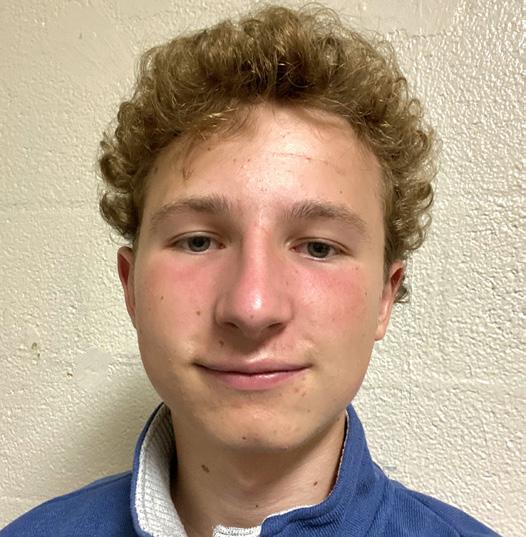
in a collaboration with Nicki Minaj. “Princess Diana” gave Spice two of the top ten spots, with No. 10 being her collaboration with PinkPantheress, though it dropped to No. 29 this week.
A few months ago, Ice Spice wasn’t even breaking into the Top 50. Ice Spice’s previous music has sometimes been disregarded, held at a distance with facetious enthusiasm, but with Nicki’s influence, this track unironically goes hard. It reminds me of the 2018 collab “Gucci Flip Flops” between Dr. Phil meme Bhad Bhabie and Lil’ Yachty: a perfect mix of absurd personality, social context, solid production, and flow.
Personally, I’ll be looking

SPOILER ALERT Evil Dead Rise
BY ITAI GELLER ‘26In this week’s Artist Spotlight, I will cover the influential and controversial Italian painter and sculptor Umberto Boccioni. Boccioni was best recognized for leading the Italian Futurist movement in the 20th century, which was a heavily politicized art movement known for its passionate support of industrial domination and the dismantling of social norms and culture which glorified the past. This included calls for the destruction of museums, libraries, and an end to the feminist movement. Clearly a very nationalistic movement, it comes as no surprise that Italian Futurists would go on to rally in support of Italy’s Nazi leader Benito Mussolini at the advent of World War II. Boccioni’s influence on the movement came early on in its life, specifically during the 1910s before World War I (the war which would claim his life).
Boccioni began his artistic journey in the city of Milan, where he also met the leader of the Futurist movement, a poet by the name of Fillipo Marinetti. Marinetti urged Italians to embrace modernity, as he
believed that on the world stage, Italy was falling behind its heavily industrialized neighbors. More specifically, in his manifesto The Founding and Manifesto of Futurism, Marinetti encouraged artists to abandon more traditional methods of artistic expression in favor of depicting the industrial revolution taking place in Italy. Having briefly experienced the youthfulness of Paris, Boccioni sympathized with Marinetti, having found a sense of belonging to the industrial city of Milan. This is best depicted in his painting The City Rises, which represents the laborious nature of Milan’s main industrial development in the agriculture industry. In this article, I will analyze both Boccioni’s The City Rises and Antigraceful. Unlike The City Rises, Antigraceful is a cubist sculpture that focuses on creating spatial planes in his more expressionist style. In The City Rises, Boccioni experiments with a style most closely compared to a mix between expressionism and pointillism. He uses an impressively precise system of individual brush strokes to portray different characters. Although the piece’s background is a very calm portrayal of industrial Milan, the foreground contains a chaotic scene in which Italian agricultural workers symbolically attempt to rein a horse. The individual brush strokes he uses to portray the workers and horses give the foreground a lot more fluidity, indicating a drastic change in a positive direction, similar to the newfound modern aesthetic of Mi-
lan in the early 20th century. I especially like the colors he uses for the foreground; they are incredibly vibrant and really help create a good contrast with the relatively original portrayal of Milan in the background. The horses are done in bright orange and red, making the scene look like a growing fire, symbolic of the Futurist movement’s overpowering nationalism.
In contrast, Antigraceful doesn’t seem to relate to the Futurist movement. In actuality, it is a criticism of contemporary representations of beauty. The sculpture is a cubist bust of Boccioni’s mother, which utilizes geometrically unique pieces to assemble her face. Although if I was Boccioni’s mother I likely wouldn’t approve of it, I am entertained by Boccioni’s unique means of illustrating natural human features such as wrinkles and bone structure in a more playful manner. When I look at it, I see hints of industrial structures mixed in, such as pillars and tracks.
Although I can’t say I agree with Boccioni’s radical analysis of contemporary society and rejection of common social norms and traditional values, I still think that he is an incredibly talented and versatile artist. Oftentimes, people are very quick to write off artists simply because they do not agree with them. Art is often meant to be provocative or political: this is natural. I would encourage others to be less sensitive when analyzing art, as it makes it easier for the artist to communicate their ideas.
BY COLE GARDELLA ‘24When I started writing for The Stute in the fall, my first film review was the 2017 horror movie Get Out. So, it only seems fitting that my last review for the academic year should be another horror movie, although instead of a psychological horror movie like Get Out, I will be reviewing the new supernatural horror movie that was released a few weeks ago: Evil Dead Rise.
Evil Dead Rise is the fifth installment in the Evil Dead franchise, although it is not necessary to see the previous four movies to understand the plot of Evil Dead Rise, which concerns a family in a Los Angeles apartment building that is being threatened by the rise of demons that can possess humans.
One of the many aspects that make the Evil Dead franchise so great is their use of practical effects for all of the gore in the movies, and Evil Dead Rise might just take the cake for the best effects work in the series. The effects department really did
a fantastic job of making all the violence and kills in the movie look both gruesome and realistic enough to make anyone’s stomach turn.
One more part of Evil Dead Rise that I find to be particularly noteworthy is Alyssa Sutherland’s performance as Ellie. The juxtaposition of her character before and after her possession in the apartment building’s elevator is incredibly impressive on her part, as she manages to go from a sweet and sympathetic single mother to a cruel and horrifying

out for Sir Chloe’s newest album I Am the Dog, and relying on recent favorites from artists my mom gets mixed up: Un Verano Sin Ti by Bad Bunny and Emotional Creature by Beach Bunny.
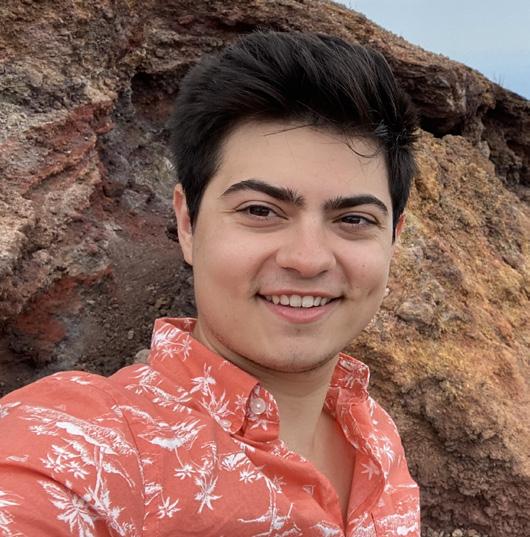
Sir Chloe saw success with Party Favors and its TikTok powerhouse “Michelle,” though singles off of the new album turn in a new and very compelling direction; I highly recommend “Salivate.” As the outdoor concert season approaches, I encourage you all to go see some live music, whether it’s jazz in the park or a sweaty beach festival. Supporting local artists is enriching personally and to the community; you’ll never know what you’re missing out on if you don’t try.
Deadite within a matter of minutes. I would not be surprised if Sutherland’s performance in the film lands her a few roles in future projects.
Evil Dead Rise has been receiving very positive reviews from critics and audiences alike, and the details I mentioned above are just a few of the reasons why it is earning such acclaim. Evil Dead Rise is a great choice if you’re looking to go to the theater for a good scare, and a must-see for any and all horror movie fanatics.
HISTORY OF THE DUCKS
Living life as a duck: The S.S. Stevens
their own Palmer or Castle Stevens, but most schools don’t have a boat that they float in the Hudson River and call a dorm. Today, I am happy to explain what exactly S.S. Stevens was.
BY EVAN PAPAGEORGEThis article is the last one for this semester. Looking back, I have covered most of the most significant buildings on campus that have historical meaning. Sadly, I have had to skip some (Peirce, Kiddie, Burchard, River Terrace, the Gatehouse, etc.). To end, though, I wanted to cover something unique. Most schools have
In 1967, under the leadership of President Jess Davis, Stevens Institute of Technology was experiencing a surge: increased student population, the construction of new buildings like Burchard, the Wesley J. Howe Center, and plans for more facilities like the Samuel C. Williams Library were well underway. However, despite a plan for more dormitories, the school needed more bed space for students — faster than a building could be created.
After a long life in military service, in June of 1967, the United States Maritime Commission announced that one of its ships,
the Exochorda, was for sale under the conditions that it would be scrapped or at least not be used for transportation. With the assistance of shipbuilding experts, Stevens submitted a bid to buy the Exochorda to transform it into the dorm space it so desperately needed. Then, on September 26, 1967, it was announced that Stevens had submitted the highest bid, by nearly $6,700.
A week later, on October 4, McAllister Brothers and Bethlehem Steel, two Hoboken companies, brought the Exochorda from the shipyards at Stony Point, New York to Hoboken. For about a month, the Exochorda was renovated from a military-grade, World War II-era fighting ship into a livable, floating dormitory. The engine room was sealed off, the living quarters were converted
into double-style dorms, the ventilation system was refurbished, and electricity and water from the campus’s supply were permanently connected to the ship at its new home at the 8th Street Pier.
On November 10, 1967, at a ceremony attended by students, faculty, Trustees, and Hobokenites, President and Mrs. Davis rechristened the ship as the S.S. Stevens. The ship opened to upper-classmen for the rest of the fall semester and opened to first-years during the beginning of the spring semester in January of 1968. For its nearly eight-year tenure at Stevens, it housed around 150 students at a time.
Life aboard the S.S. Stevens was lavish, but still had some typical aspects as being a college dormitory—student lounges on the upper decks and modestly sized
Getting ready for finals season
BY ZOE HACK ‘24It’s hard to believe that the semester is almost over, and unfortunately, with the anticipated (and much-needed) upcoming break comes the final haul of final exams. Here are some tips to keep you going through the exhausting finals period so you’re ready to take full advantage of your well-deserved break:
1. Make a plan!
Look at the final exam schedule and make note of all the days and times that you have exams — make sure to revisit this the day of to check for any changes in the room number. From there, you can backtrack and set a timeline for reviewing specific topics in order to successfully prepare. Make sure you give yourself enough time to spread out the material so you don’t end up cramming! Try to make a little bit of progress every day so you’re not overwhelmed at any given time and always doing something productive with your limited time.
In addition to planning out the timing of your studying, make sure you know what is on the exam. Check the syllabus for your course to see what information it gives on the final: is it cumulative, does it focus on a certain topic, what is the test format? If no information
DEAR CLAIRE AND ETHAN...
is specifically outlined about the final, learning objectives or outcomes are definitely a good place to start while figuring out what topics to study for the final.
2. Find people to study with
Don’t be afraid to reach out to other students in your classes to get together to review material before an exam! Collaboratively studying is one of the best ways to increase understanding and make sure that everyone is prepared for success! See if your peers want to meet up in the library, go to a coffee shop, or even hop on a Zoom call to review topics and help each other study.
3. Short-term goal setting
Setting short-term goals is one of the easiest ways to feel super confident in your progression of any task. It’s great to have an idea along the lines of “I
Q: Did you enjoy writing this column?
want to get an A on this exam,” but the easiest way to reach that goal is to set short-term goals that will make success more seamless. Maybe three days before the exam you decide to finish reviewing all material that will be covered, so you can spend the rest of your time leading up to an exam focusing on specific topics you want to spend extra time on or are struggling with. Set short time goals that are both achievable for you, but also helpful along your road to topic mastery.
4. Office hours, and review sessions
If you are ever struggling to understand a concept, don’t hesitate to reach out to your professors! They will more likely than not be willing to lend a helping hand. Frequenting office hours is another way to foster good professional connections for your future endeav -
sleeping quarters—with the added bizarreness of being a boat. However, there still were emergency power generators, a brig, shipwide alarms, and military-naval safety features like watertight doors and reinforced steel frames.
The S.S. Stevens served as a dorm until August 1975, when rising maintenance costs and the need for extensive repairs forced the school to sell the ship.

The S.S. Stevens is one of the most unique and historical structures at Stevens. I want to thank Bruce Blondia, Stevens Class of 1971 and a resident of the S.S. Stevens for helping me learn about the ship and offering some amazing stories. So remember as you look down towards the Hudson, the history of the Stevens students truly living as Ducks: floating on the S.S. Stevens.
BY CLAIRE HANNAN ‘24Yes! Writing this column has been a great time. Getting a chance to connect with campus and write weekly about what I’ve learned throughout my three years at Stevens has been a good way to reflect on
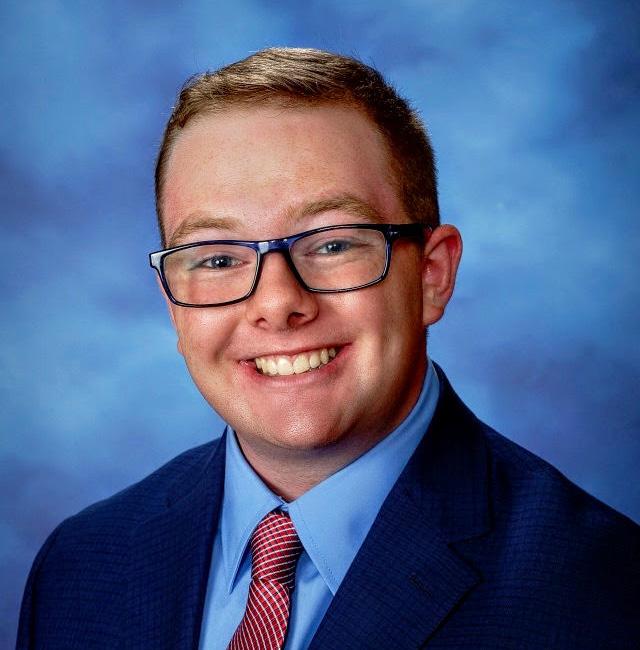
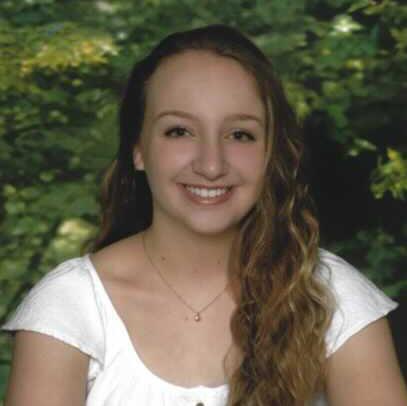
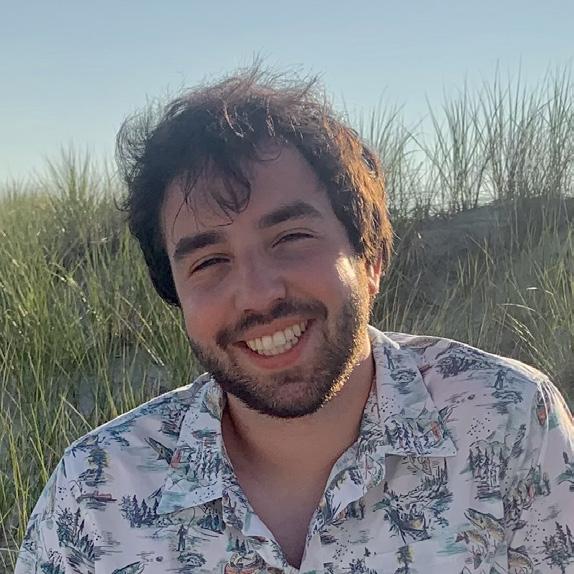
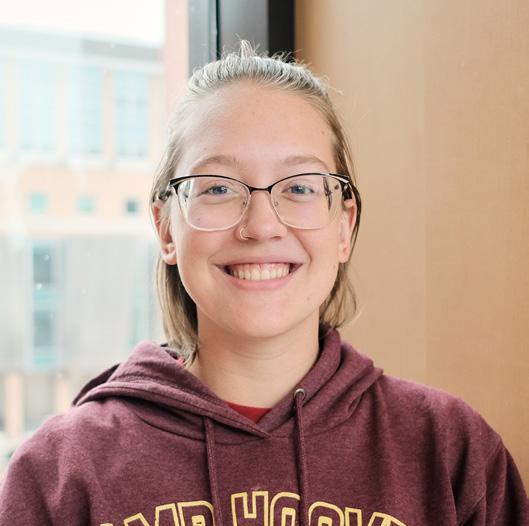
and appreciate my experience. When I first joined The Stute, I thought I would just write a few articles occasionally, and maybe get to add a new bullet point under the communication section of my resume. Over the past year though, I’ve gotten the opportunity to be an editor, write every week, and am now the Secretary for the 2023-2024 school year. I owe a lot of that involvement to this column and I would encourage anyone reading to get involved with writing for The Stute. Even if you’ve never had much luck with writing in the past, that’s okay; I never particularly stood out in middle
or high school English which is exactly why The Stute is so great for me. By doing something that I find difficult, I’ve been able to become a more well-rounded student, and it had the great side effect of getting to meet and talk with people all across campus. For those of you looking to write a column specifically, I would first recommend that you write a few articles regularly for our news, science, or sports section and start thinking of themes for your column. After that, you can put in an application. We accept applications before the start of the fall and spring semesters.
BY ETHAN KLESCHINSKY ‘24No, I have dreaded every second I have spent writing. Every word I have put to paper has been excruciating. See, I don’t hate being an opinion columnist, I actually quite like it. But, it
ors, so if you need help, don’t be afraid to speak up! Additionally, many professors or organizations around campus hold really helpful review sessions for big exams that are a great way to assess your understanding of the material and spend time with others in the same position as you.
5. Stay positive!
While it can be super easy to get caught up in the stress of the end of the semester, there are so many good things to also keep in mind, like being proud of yourself for finishing another semester, looking forward to any potential summer plans, or just needing a BREAK. By focusing on something positive whether it be in the near or far future, it might just feel like time is going by a little quicker than it is, making this stressful time of the semester more bearable.
is impossible to enjoy a job where I spend my time answering questions that are boring and have common sense answers. I really enjoyed that one week when Claire and I were asked what was the meaning of life. That was a fun one that left me a lot of room to give actual thought and input to the question asked of me. However, it is a waste of my time and yours when the questions are along the lines of “what do I do during a water main break?” I am pretty sure the city of Hoboken answered that well before me. This column is not what I thought my career as an
opinion columnist would be like, but I guess I’m now just the guy that answers meaningless questions for your amusement. I know you all love my wisdom so much, so don’t get too excited because I’m not making any promises, but I would think about continuing this column if the questions being asked were not classified as a total waste of my time. I’m going to be a senior, so I’ll have better things to do like sleep and neglect my responsibilities. But at the end of the day, I will do what the people want, and if that means suffering another year I will at least consider it.
Hard Puzzle: 0.65 difficulty
ROVING REPORTER
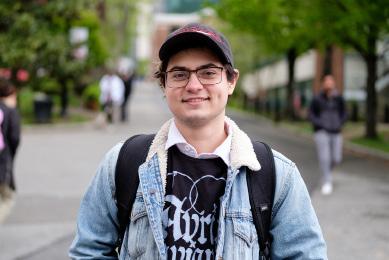

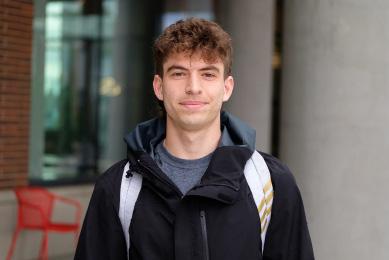
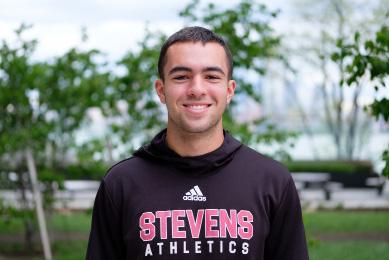 By Rafael Lee Li and
By Rafael Lee Li and
Hard
0.61 difficulty
BARACK OBAMA AND JOE BIDEN
GEORGE H W BUSH AND DAN QUAYLE THOMAS JEFFERSON AND AARON BURR
GEORGE WASHINGTON AND JOHN ADAMS BILL CLINTON AND AL GORE
PRESIDENTS AND VICE PRESIDENTS:
OHIO
MAINE
OREGON
ALABAMA
KANSAS
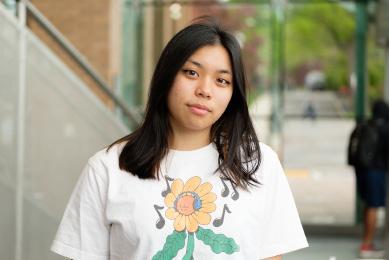
US STATES:
OLAY
L’OREAL
ESTEE LAUDER
MAYBELLINE CLINIQUE
COSMETICS BRANDS:
PORTUGAL
AUSTRIA
CROATIA
GREECE
SPAIN
EUROPEAN COUNTRIES:
NIGHT AT THE MUSEUM
SOCIETY
DEAD POETS
ALADDIN
JUMANJI
GOOD WILL HUNTING
FILMS:
ROBIN WILLIAMS
OBOE
TAMBOURINE
VIOLA
PIANO
ELECTRIC GUITAR
MENTS:
MUSICAL INSTRU -
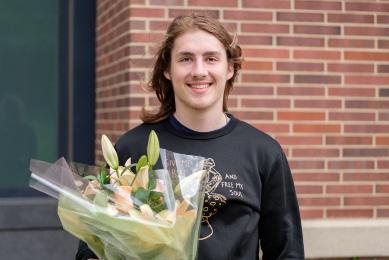
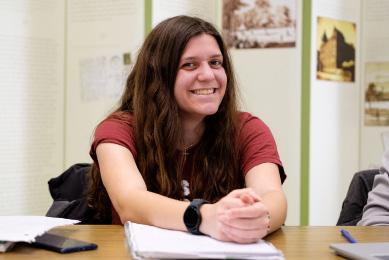
THIS WEEK’S ANSWERS:
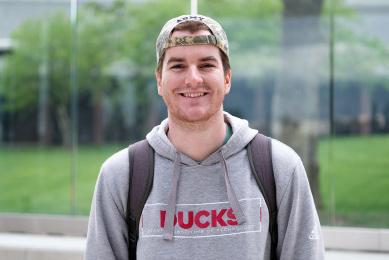
PLEASE can I have your Snapchat please.”Kayden Cannilla ’24 “More of a conversation starter: What’s your favorite type of bread?” (still single) Jillian DeGeorge ’24 “hey (with rizz)” Nicolas Accardo ’25 “No pen no paper but you drew my attention.” Gianna Adamo ’26 “Bro, you’re asking the person with no rizz.” Liam DeRubertis ’25 “Are you from Tennessee...”
“What’s your go-to pickup line?”
Mia PetrolinoPuzzle: Emily Retino ’26 “If
I had to choose between RNA and DNA, I would choose RNA because it has U in it.”Cooper Kinsley ’26 “Let’s play Titanic: you’ll be the iceberg and I’ll be going down.”
